In two weeks, LGBTQ people in the United States go to the polls hoping to overthrow tyranny with a little democracy. It’s a scary time to be a minority in this country, but the 2018 Midterms offer a little bit of light in the darkness. According to the Victory Fund, this is the first election in the history of the U.S. where LGBTQ people are running for office in all 50 states. They join the record number of women running for office. Below you’ll find a comprehensive voting guide that lists (what we think are) all the LGBTQ candidates running for federal offices and seats in state legislatures. It also includes relevant statewide ballot measures — including Massachusetts’ first-of-its-kind initiative to repeal protections for trans people — and a handful of non-LGBTQ races that are extra important this year. (If we’ve missed anyone, gently let us know in the comments and we’ll investigate.)
This guide was written by Natalie Duggins, Carmen Phillips, Molly Priddy, A.E. Osworth, Yvonne Marquez, Raquel Breternitz, Carrie Wade, and Heather Hogan — with a vital assist by Laura Mandanas. In addition to the resources linked below, we consulted the Victory Fund and Ballotopedia extensively in our research.
Alabama
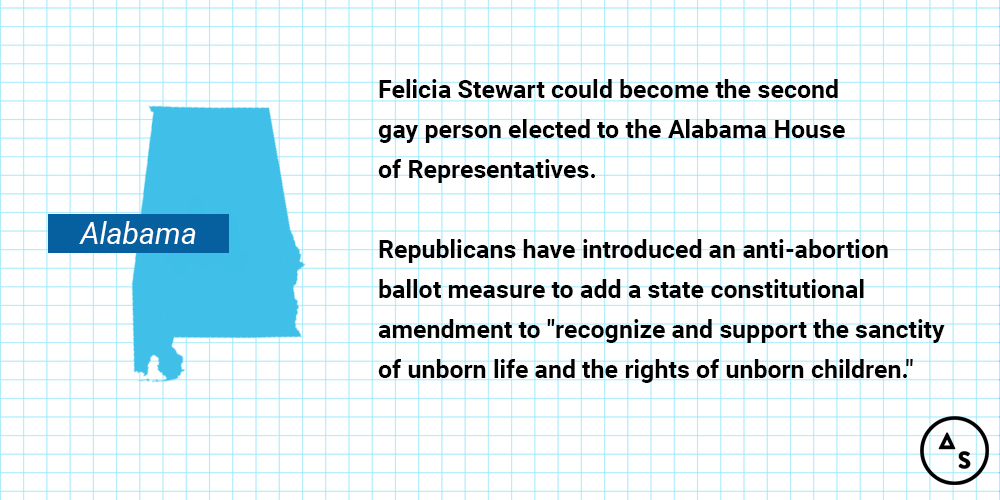
Felicia Stewart
Alabama State House, District 46
We’ve covered Felicia Stewart before and with good reason — she would be the second gay person ever to be elected to the state legislature in Alabama. The issues she’s running on seem to be no-brainers, things like vowing to read bills before signing them, but apparently this has been a problem in the Alabama State Legislature. She’s interested in making sure Alabama moves forward instead of backward. She’s also campaigning on “job and wage growth, education, criminal justice reform, healthcare and environmental protection instead of spending valuable time debating non-existent problems like bathroom choice, how quickly we can kill a death-row inmate and what measures need to be in place to forever enshrine confederate monuments.”
Bonus Ballot Information
+ Alabama Amendment 2 would add a constitutional amendment to limit access to abortions. A no vote “opposes this amendment to make it state policy to “recognize and support the sanctity of unborn life and the rights of unborn children, including the right to life” and to state that no provisions of the constitution provide a right to an abortion or require funding of abortions.”
Alaska
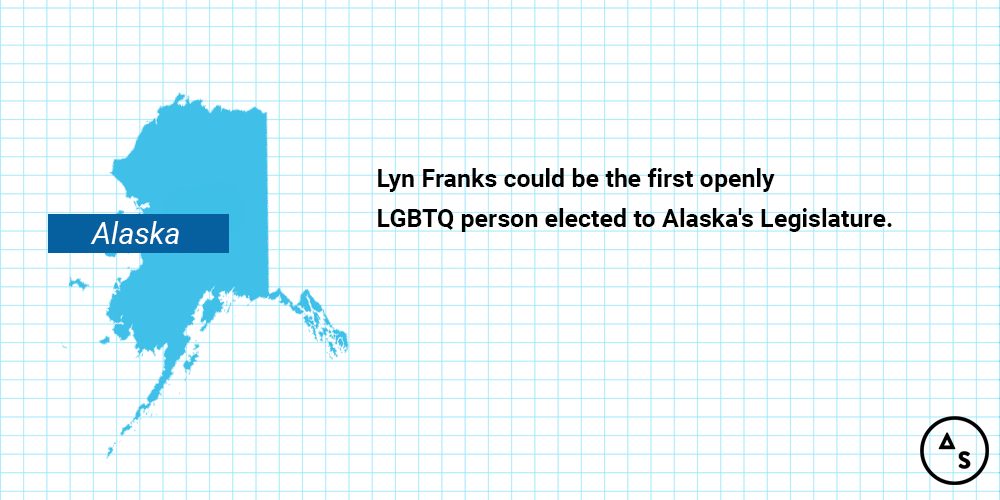
Lyn Franks
Alaska State House, District 15
After winning a nail biter primary, Lyn Franks is facing off against Republican incumbent Gabrielle LeDoux in the general election. Franks is an adjunct history professor at the University of Alaska-Anchorage, a member of the steering committee for March On Alaska, and an active member of Anchorage Faith Action Congregations Together. Her priorities include bringing affordable healthcare to all Alaskans, protecting Alaska’s vast natural resources, fully funding public education, and protecting unions. If elected, Franks would be the first openly LGBTQ person elected to the Alaska Legislature.
Arizona
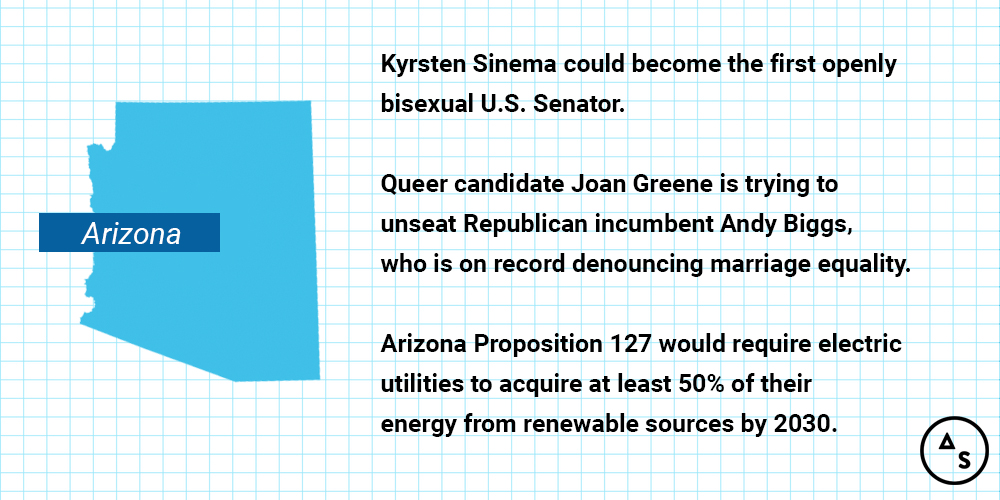
Kyrsten Sinema
United States Senate, Arizona District 9
Krysten Sinema has gone from progressive to more of a centrist in an effort to engage folks from the other party, and honestly I’m not convinced it’s not a good idea in a state that hasn’t sent a Democrat to the US Senate since 1980. Her priorities are hyper-specific and include fixing the Arizona VA, getting highspeed internet to rural areas (a HUGE must), bipartisan coalitions for problem solving (hard for me to swallow when the Republican party is Nazis, but I WILL TAKE IT), and making sure that anyone with a uterus can make necessary decisions about reproductive health without government interference. She is also an experienced politician at the State and Federal level, currently serving in the House of Representatives. FiveThirtyEight puts her chances of winning at 63%, but she’ll need all the votes she can get against a strong Republican challenger.
Joan Greene
United States House of Representatives, Arizona District 5
Joan Greene has been an entrepreneur in Arizona for a good long time and thinks that everyone should have a shot at their version of the American Dream. Lovely sentiment, but it truly is backed up with her platform, which includes investing in infrastructure, single-payer healthcare (with an argument that it will allow small businesses to flourish, which honestly might be the way to talk to those clinging to old Republican ideals about this?), leading the solar energy field with all that Arizona sunshine, and an eye to the state’s future with clean water.
As an educator myself, I’m particularly fond of her debt-free tuition for community colleges idea and her loan forgiveness program, which will entirely forgive a loan for working two years in a high-need area. Read her profile over at Broadly.
Daria Lohman
Arizona State Senate, District 23
Daria Lohman is a Veteran who served tours in Vietnam, but more importantly for her legislative potential, she has experience working in software and cybersecurity — 33 years of experience, to be precise. I often complain that legislators on both State and Federal levels don’t seem to understand computers or the internet, and the impact such things can have, and so they cram them into legislation written in the 1800s, when all of this would have been witchcraft. Elect people who understand computers so they can make informed decisions on legislation about computers! Lohman prioritizes a fully-funded K-12 public school system, expanding affordable healthcare beyond the Medicaid expansion, and investing in infrastructure to attract more businesses — and more people! — to Arizona.
Bonus Ballot Information
+ Arizona Proposition 127 is a renewable energy standards initiative. A yes vote “supports this constitutional amendment to require electric utilities in Arizona to acquire a certain percentage of electricity from renewable resources each year, with the percentage increasing annually from 12 percent in 2020 to 50 percent in 2030.”
Arkansas
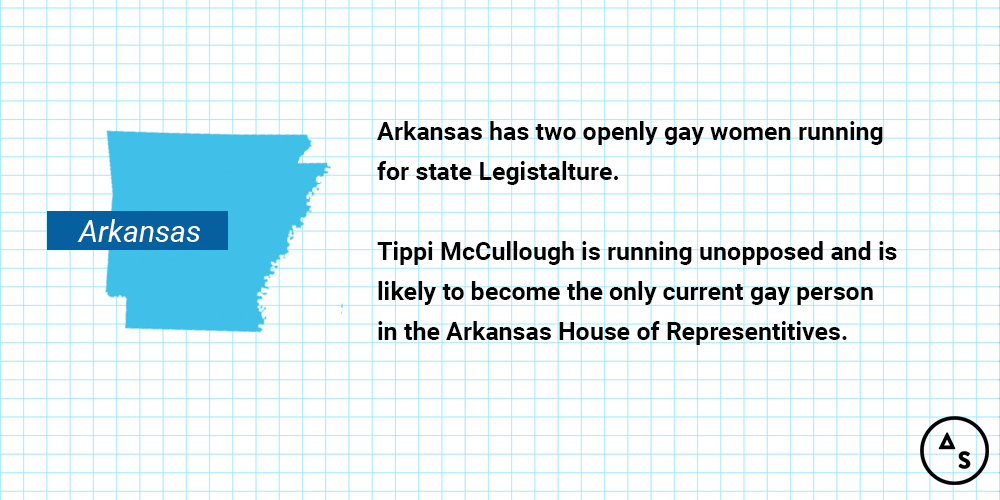
Tippi McCullough
Arkansas State House, District 33
Tippi McCullough doesn’t currently have a campaign website, so it was a little hard to suss out her platform. But according to our own Laura Mandanas, her priorities include “opposing charter school expansion; raising the minimum wage; fighting for anti-discrimination policies; keeping after-school programs; ensuring access to quality, affordable healthcare; fighting climate change and protecting our environment; closing loopholes in ethics laws; fighting bathroom bills and other anti-LGBT proposals; and repealing Arkansas’s overly harsh eviction laws.” She was originally inspired to run for office after being fired from a teaching job for getting gay married, which is among my worst nightmares as an educator and I think about it all the time. According to the Victory Fund website, McCullough is currently unopposed and will be the only openly gay woman in the Arkansas State House.
Christie Craig
Arkansas State House, District 96
Christie Craig grew up in rural Arkansas and is a first generation college graduate. Her priorities include bringing jobs to Arkansas’ farm country, ensuring access to affordable healthcare, and protecting the civil rights of minorities. She lives in Rogers with Audra, her partner of 15 years; they both volunteer with the local Humane Society.
Bonus Ballot Information
+ Arkansas Issue 5 would raise the minimum wage. A yes vote “supports the ballot initiative to incrementally raise the minimum wage in Arkansas to $11 an hour by 2021.”
California
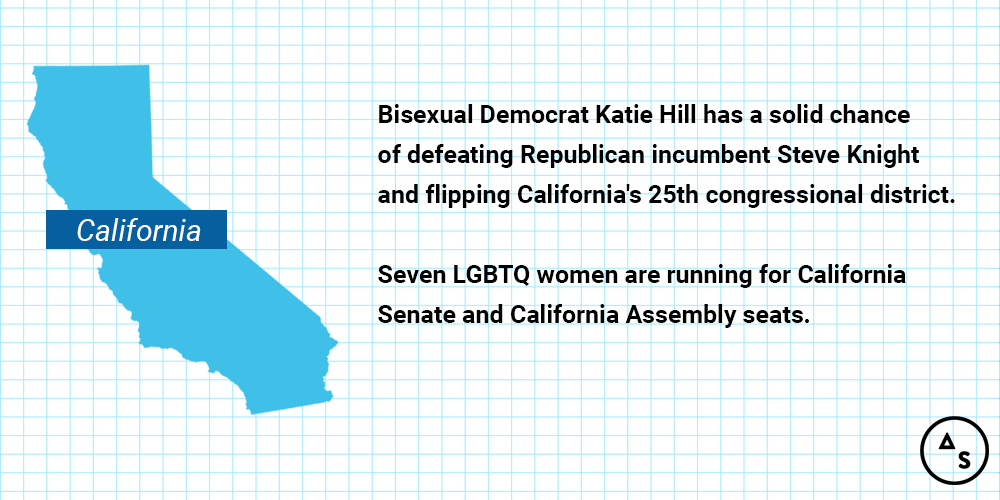
Katie Hill
United States Congress, California District 25
This one has turned into a high-profile race for a whole host of reasons, not the least of which is that District 25 is well and truly a wild card: the most conservative congressional district in Los Angeles County (it’s home to the Ronald Reagan Presidential Library) and the only district to include City of LA and be currently represented by a Republican. Katie Hill is hoping to unseat Trump stooge Steve Knight by emphasizing affordable housing — which she knows plenty about thanks to her time as executive director of People Assisting the Homeless — along with healthcare, gun reform (40% of households in District 25 own guns, and Hill is a lifelong gun owner who supports bans on bump stocks, assault weapons, and high-capacity magazines), support for the DREAM Act, and representative government.
Despite being the largest voting bloc in the country, young people are woefully underrepresented in legislatures — a problem Hill is hoping to fix. “For young voters, it’s truly about: Why should they bother? I think it’s a matter of having people who actually get it. Who actually are going to fight for you,” she told Rolling Stone. “That means showing vulnerabilities, showing your flaws… I’ve opened myself up to exposure in a way that is risky because it’s the real me.”
Fittingly, Hill routinely mentions her LGBTQ identity in interviews, and would be one of the only bisexual women in the House, if elected.
Sonia Aery
California State Assembly, District 3
A self-described “proud daughter of Indian immigrants” who puts her queerness right out there in her Twitter bio, Sonia Aery is running a campaign focused on fair housing, women’s rights, education, racial justice, and the environment. She opposes the sit-lie ordinance that recently passed the Chico City Council (which would prevent sitting or lying on sidewalks abutting commercial properties between 7:00 am and 11:00 pm) and supports requiring employers with 500 or more employees to publicly disclose gender-related pay gap statistics, extending the statute of limitations for sexual harassment claims, and instituting civic participation classes in prisons, among other progressive reforms. Her platform has generated endorsements from the Planned Parenthood Action Fund, Equality California, and Run for Something.
Jovanka Beckles
California State Assembly, District 15
Jovanka Beckles is running against fellow Democrat Buffy Wicks in November thanks to California’s top-two primary system (where the top two finishers advance to the general election regardless of party). As a Democratic Socialist, she’s pushing affordable housing, single-payer healthcare, and criminal justice reform. She’s also a card-carrying member of the Teamsters Joint Council 7, and her platform is appropriately heavy on workers’ rights: a $20 minimum wage (California’s is $11 as of January 1), the option of a 36-hour workweek, expanded protections against workplace sexual harassment, full-time benefits starting at 30 hours per week, and one year paid parental leave.
Beckles’ time on the Richmond City Council was formative — and not always for the best reasons. “During my first term I was subjected to discriminatory insults and abuse by other City Councilmembers as a black, Latina immigrant and the proud partner of my wife,” she explains. “These attacks pained and saddened me but I held my ground, focused on improving the lives of Richmond’s working people.” Should she join the State Assembly, Beckles has promised to advocate for LBGTQ and HIV-positive seniors in long-term care, oppose religious exemptions that permit queerphobic discrimination, and include incarcerated trans people in her Medicare for All plan. She’s also in favor of strengthening California’s sanctuary state laws to prevent state contracts with private contractors who collaborate with ICE and participate in building the border wall.
Sabrina Cervantes
California State Assembly, District 60
Sabrina Cervantes beat the odds to unseat Republican Eric Linder in 2016 and is currently locked in a tight reelection race. At 30 years old, she’s already accomplished an impressive amount in the Assembly, including authoring six different bills that were signed into law. (For those of you playing along at home, that’s a lot.) One of her signature pieces of legislation helps small businesses secure loans to comply with the Americans with Disabilities Act; since the US House of Representatives recently thought a better solution was to gut the ADA altogether, I’ll take Cervantes’ approach any day.
She also wrote AB 1896, which ensures that conversations between student sexual assault survivors and counselors on college campuses remain confidential, and coauthored a resolution to officially recognize the Armenian Genocide. She’s been endorsed by California Senators Dianne Feinstein and Kamala Harris, among others.
Susan Talamantes Eggman
California State Assembly, District 13
Susan Talamantes Eggman comes from a military family and enlisted in the Army as a combat medic after graduating from high school. She worked at Fort Meade Army Hospital in Maryland — which is also where she met her wife. When she joined the Stockton City Council in 2006, she became the first openly gay person to serve as part of that body. She’s now a member of the California Legislative LGBT Caucus and California Latino Legislative Caucus.
As the incumbent in her race, Eggman is pushing her record on women’s rights, job creation, and higher education. She’s called opening a California State University campus in Stockton a top priority. Notably, she also authored AB 168, the 2017 bill that made it illegal for California employers to ask for applicants’ salary histories and has played a big role in shrinking the state’s gendered pay gap. She called the bill “a needed step to ensure that my 9-year-old daughter, and all women, can be confident that their pay will be based on their abilities and not their gender.”
Eggman is Acting Chair of the California Legislative Women’s Caucus and recently released a blistering joint statement with Vice Chair Connie M. Leyva on the confirmation of Brett Kavanaugh to the US Supreme Court. “Following the credible allegations of sexual misconduct, we are appalled that the United States Senate has confirmed Judge Kavanaugh to the highest court in the land,” the statement reads. “Survivors of sexual assault must not let this vote dissuade them from coming forward; rather we hope that they will take courage from the example of Dr. Christine Blasey Ford. We believe her.”
Sunday Gover
California State Assembly, District 77
Experts on both sides are watching this race closely as first-time candidate Sunday Gover takes on Republican incumbent Brian Maienschein. Despite District 77’s conservative bent and Maienschein’s status as generally-well liked, the area went for Hillary Clinton by 16 points in 2016, making it a prime contender to flip. The Republican margin in the district is hovering around half a percentage point — way down from the 7.5 percent cushion the GOP enjoyed when Maienschein took office in 2012.
Gover steps into this shifting climate with what one wary Republican strategist called “the post-2016 energy going for her.” She’s running on a platform of increased healthcare access and credits Planned Parenthood with helping her survive a cancer diagnosis at age 21. She’s also endorsed by the California Teachers Association thanks to her emphasis on public school funding, universal pre-K, increased STEM education, affordable college, and keeping guns off of school campuses. (Maienschein’s A rating from the NRA isn’t looking too great by comparison.)
Above all, Gover is dedicated to “ensuring that the Trump agenda does not come to California.” She rightly credits immigrants with “making our community thrive” in District 77. And she’s committed to fighting another misguided Trump plan to drill for oil off the California coast, earning her the support of the Sierra Club and the League of Conservation Voters.
Speaking of endorsements, Gover initially split the endorsement from Equality California with Maienschein — but they’ve since withdrawn their support for him and urged voters to back Gover outright.
Joy Silver
California State Senate, District 28
Community advocate Joy Silver is known for her work on behalf of LGBTQ seniors, particularly as a two-term board member for the American Society for the Aging and former CEO of the queer-friendly retirement community Rainbow Vision. She’s earned some heavy-hitting endorsements from the Victory Fund, Lesbian Political Action Committee, Planned Parenthood Action Fund, California Teachers Association, sitting Representative Mark Takano, and former US Senator (and current MSNBC fixture) Barbara Boxer in her race against incumbent Jeff Stone.
Silver’s top-line issues are expanded affordable housing and improved healthcare access. She’s pledged to reduce prescription drug costs, protect the Affordable Care Act, increase the number of quality homeless shelters in her district, and prioritize preventative care. She lives in Palm Springs with her partner and would be the first queer person to represent CA 28 in the State Senate if elected.
Jackie Smith
California State Assembly, District 6
Jackie Smith returned to finish her college degree after the birth of her son, so it’s fitting that her platform focuses on working families. She advocates for paid family leave, affordable day care, and universal pre-K, as well as job creation via improved resources for young people. She is in favor of California’s state Medicaid expansion and has vowed to protect the Affordable Care Act; supports the DREAM Act and the Keep Families Together Act; and is working to support the rapidly growing senior citizen community in her district through reduced prescription drug prices, internet access and training, and more robust public transit.
“I am a proud member of the LGBTQ community,” Smith says. She founded the Placer Stonewall Democrats and is on the executive board for the LGBT California Democratic Party, in addition to serving as a longtime board member of Sunburst Projects, a camp for children with HIV/AIDS. And on reproductive rights, she keeps it simple: “Roe vs. Wade is the law of the land.”
She lives with her partner and their trio of rescue pets: Cleo, Natasha, and Sushi.
Colorado

Rochelle Galindo
Colorado State House, District 50
Rochelle Galindo got her start in politics working as a field organizer for President Obama in Colorado in 2012. Two years and a few grassroots campaigns later, she received the Community Leadership Award from the Hispanic Women of Weld County. In 2015 she became the first openly gay person ever elected to the city council in Greeley, CO, where she made waves by asking her fellow councilmembers to consider a citywide resolution supporting immigrants and refugees. Her heritage and her politics have led to attack ads from her Republican opponent claiming she wants to put “violent illegal immigrant gang members back onto the streets of Colorado communities” and make Colorado a “sanctuary state for criminal illegal immigrants.” If elected she would be one of the first two LGBTQ Latinas to win a seat in Colorado’s House of Representatives.
Sonya Jaquez Lewis
Colorado State House, District 12
Sonya Jaquez Lewis is a small business owner and licensed pharmacist who decided to run for a seat in the Colorado legislature when the local gas company stated their intention to put a massive, multi-well production pad 500 feet from the home she shares with her wife. It’s something she already has experience with; as a member of the Boulder County Board of Health, she votes for an oil and gas moratorium in Boulder County, which lasted for five years. Her other top issues include access to affordable healthcare, gun control, and a variety of LGBTQ issue, iincluding easier and fairer access to vital records for trans people, and standing up against the Trump’s administration’s hateful policies at every turn. If elected she would be one of the first two LGBTQ Latinas to win a seat in Colorado’s House of Representatives.
Daneya Esgar
Colorado State House, District 46
Daneya Esgar is a progressive Democrat already serving her community in the State House and has been since January 2015. It’s nice when folks are running for the position they’re already in, because you can take a look at the bills they’ve sponsored to help make your decision. This year, Esgar co-sponsored HB18-1046, New Birth Certificate to Reflect Gender Change, which aimed to change the state’s birth certificate laws to be fairer and safer for trans people. The bill passed the House, but died in the Senate. But any person who’s trying to make it just a little bit easier to be trans in this world would certainly have my vote. Her Twitter is a valuable place to see her talk about her top priorities, which include her wife making really hot salsa.
Joann Ginal
Colorado State House, District 52
Dr. Joann Ginal is another out-lesbian in Colorado (good job Colorado), and another incumbent (so we can see where her legislative heart lies). As a healthcare professional and bio-scientist, Ginal has served on Public Health Care & Human Services Committee (among other committees) and is Chairwoman of Health, Insurance & Human Services Committee. Ginal also champions patients’ rights. She sponsored the End of Life Options Act to “allow the terminally ill to self-administer a lethal dose of medication rather than continue to suffer from an irreversible and incurable illness that, in the opinion of two doctors, will cause death within six months.”
Other priorities include: expanding sources of renewable energy, analyzing the effects of fracking on human health BEFORE allowing it to occur in Colorado, and strengthening in-home services for senior and disabled Coloradans.
Leslie Herod
Colorado State House, District 8
Leslie Herod was the first African-American LGBT person elected to Colorado’s State Legislature and she’s running again this November. Once again, I recommend looking at her sponsored legislation to help formulate your opinions, but her top priorities according to her campaign website include protecting voting rights (VERY IMPORTANT AND RELEVANT RIGHT NOW), shifting focus from incarceration to prevention services, and supporting “full equality of transgender people through identification modernization, full parity in medical services and insurance, and support in schools and in the workplace.” Also here is her badass campaign ad.
Brianna Titione
Colorado State House, District 27
Brianna Titone has a background in geology and software development (making her yet another Candidate Who Understands Computers! Huzzah!). She’s also worked in an environmental science and wants to eventually reach 100% renewable energy in the state, which is very very important in this, an age where Colorado is on fire due to climate change. Other priorities include single-payer healthcare, repealing TABOR (an amendment that limits the amount of revenue the State of Colorado can retain and spend), strengthening unions and protecting access to birth control and abortion.
If elected, Titione would be the first trans member of the Colorado State Assembly. She would also flip a Republican district, so GET OUT THERE, FOLKS, AND VOTE.
Connecticut
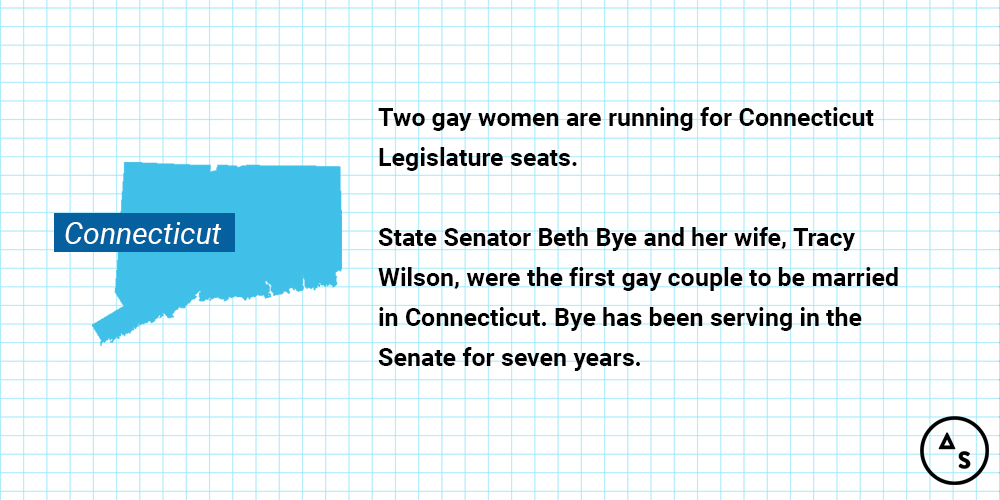
Caitlin Clarkson Pereira
Connecticut State House, District 132
Caitlin Clarkson Pereira decided to run for office when Trump announced his Muslim travel ban. She drove to JFK Airport and signed up to work as a volunteer for the demonstration that lasted several days. She became secretary of her local Democratic Town Committee not long after and is now running a tight race against Republican incumbent Brenda Kupchick. She’s been endorsed by LeapForward and Moms Demand Action. Her top priorities include balancing the state budget, funding public education and senior homes, providing better public transportation, and continuing to shore up Connecticut against the Trump administration’s erratic policies.
Beth Bye
Connecticut State Senate, District 5
Beth Bye and her wife, Tracy Wilson, were the first gay couple to be married in Connecticut. Bye is already a member of the State Senate and has been so for seven years, so she has a robust legislative history to peruse. It is sometimes, however, hard to find any of it, as Bye doesn’t have a dedicated website nor a robust and verified Twitter presence where such a history might be collected and showcased. But according to the Connecticut State Democrats website, Bye’s legislative interests include bringing high-speed broadband Internet access to Connecticut and create a centralized system for early childhood education services.
Florida
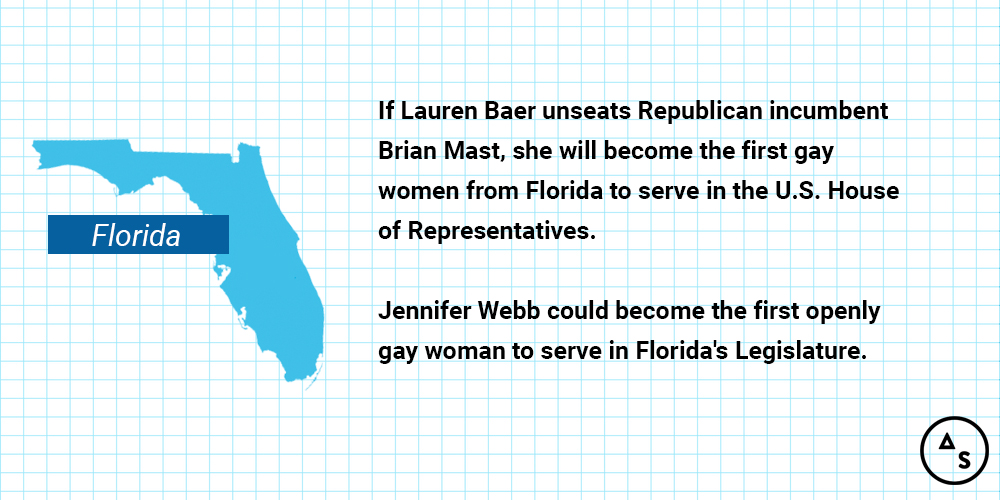
Lauren Baer
United States House of Representatives, Florida District 18
Attorney and foreign policy expert, Lauren Baer is running for the first time for office in a battleground congressional race that may affect partisan control of the U.S. House. From 2011-2017, Baer was a senior advisor to Secretaries of State Hillary Clinton and John Kerry and U.S. Ambassador to the United Nations Samantha Power. She advised on a range of national security issues related to human rights and international law during her time at the State Department. As a candidate for Congress, she stands for high-quality affordable healthcare and would enforce the ACA and expand healthcare beyond the ACA. She would fight for policies that expand the middle class and push for stronger environmental protections to keep Palm Beach County and the Treasure Coast’s waterways clean. On gun violence prevention, Baer says she would never take a penny from the gun lobby, will work to get military-style assault weapons off streets, and would ensure funding for the Center for Disease Control and Prevention to study gun violence. On immigration, Baer says she will fight for comprehensive immigration reform with a pathway to citizenship for Dreamers.
Jennifer Webb
Florida State House, District 69
Jennifer Webb ran in 2016 against incumbent Republican Kathleen Peters and lost by 14 points. She’s running again in District 69, which she points out on her website is a “top-targeted swing district.” Webb has a longtime career being a problem solver and a community-oriented leader. She’s the former director of community partnerships for the University of South Florida where she helped built projects that bring together business, the university, non-profits, and residents to create stronger communities. Now she’s the founder and managing partner of a consulting firm that specializes in business development and community engagement. Webb is a committed environmentalist who wants to protect Florida’s drinking water and waterways. She would steer construction money away from charter schools and toward publics school and encourages less high-stakes testing. She wants to improve the state’s mental health programs and spending since her sister died by suicide at age 19.
The Tampa Bay Times endorses her and says, “This may be the best opportunity in Tampa Bay for Democrats to gain a House seat.” If elected, she would be the first openly LGBTQ woman elected to the Florida Legislature. She resides in Gulfport, FL with her partner, Cynthia.
Alanis Garcia
Florida State House, District 77
Alanis Garcia was motivated to run for office when she saw how the Republican Party responded to the students who survived the Parkland shooting. Gun control is one of her major platforms. Her other priorities include LGBTQ rights and aggressive legislation to protect the environment and curb our climate crisis.
Nicole Haagenson
Florida State House, District 54
Nicole Haagenson followed in her father’s footsteps and enlisted in the Air Force after she graduated from high school. She is currently an IT director of a small business and serves as the Communications Chair for the Florida Young Democrats of Indian River County. Her priorities include quality, affordable healthcare; protecting the environment; and ensuring public education is fully funded and that students have access to comprehensive vocational training. Haagenson has five children with her partner, Cari.
Bonus Ballot Information
+ Democratic incumbent Bill Nelson is facing tough opposition from Republican challenger Rick Scott in his U.S. senate race. While polls show him with a marginal lead, there’s a real chance the GOP could flip this seat.
Georgia
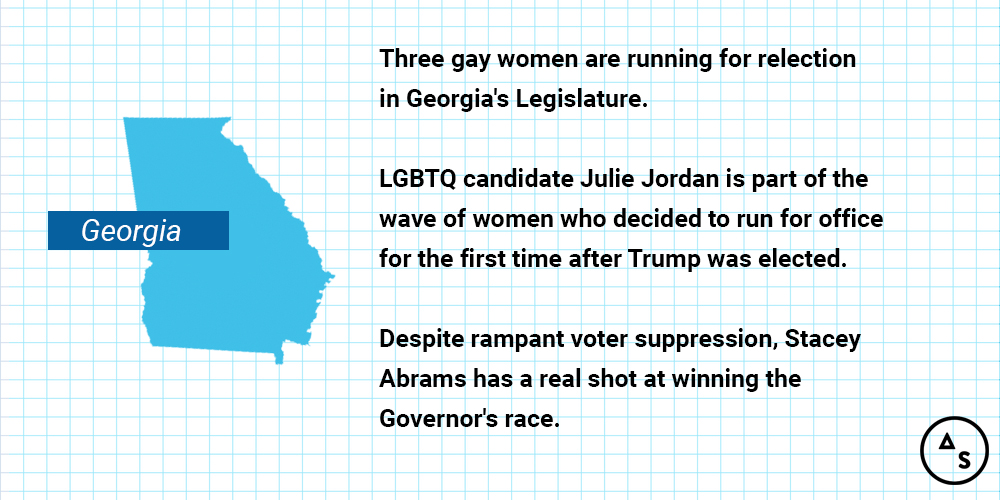
Renitta Shannon
Georgia State House, District 84
Representative Renitta Shannon, a Democrat, is an incumbent running for reelection in Georgia’s 84th State House District. Previously a medical sales representative, Shannon won her first term in a 2016 upset. She’s an outspoken leader in the battle for reproductive rights, speaking openly about her personal experience with abortion. Shannon came out as bisexual last year, and runs on a platform that’s committed to economic justice, criminal justice reform, and supporting public education. She’s also a member of 9 to 5 Working Women Atlanta, is the Executive VP for the Georgia State Chapter of the National Organization for Women, and active in the Fight for $15 campaign to raise minimum wage.
Park Cannon
Georgia State House, District 58
Park Cannon was raised on a military base in Albany, GA and elected to the Georgia State House in 2016, when she was 24 years old. After winning her 2018 primary, she is running unopposed in the general election. Cannon’s platforms include increasing affordable housing, fully funding public schools, and making sure healthcare is accessible for all Georgians. She has also been a relentless, vocal opponent of Georgia’s “religious liberty” bills.
Karla Drenner
Georgia State House, District 85
Karla Drenner was elected to the Georgia state legislature in 2000 — becoming the first openly gay member of the Georgia House — and is running in the 2018 general election unopposed. Drenner has been a staunch opponent of anti-LGBTQ legislation, including the bill banning same-sex marriage early in her tenure and the more recent “religious liberty” bills. She has co-sponsored a bill seeking to bring Georgia in line with other states’ hate crimes laws. Her platform also focuses on healthcare, the environment, and telecommunications.
Julie Jordan
Georgia State House, District 179
Julie Jordan is part of the wave of women running for office for the first time in 2018. Jordan has worked as a public school counselor and assistant principal for two decades. Her progressive views on LGBTQ equality, women’s healthcare, gun reform, public education, affordable housing, and the environment have earned her endorsements from Planned Parenthood, Greening Georgia, Emily’s List, and the Georgia Association of Educators. 90% of her campaign contributions have come from women, many of whom belong to the Women’s Voices of Glynn County, which Jordan helped found after Trump was elected.
Bonus Ballot Information
+ Despite the fact that Georgia’s Republican legislators have gone out of their way — repeatedly — to disenfranchise black voters, Stacey Abrams remains in a dead heat against Brian Kemp in the Georgia governor’s race. This is the most-watched gubernatorial race in the country this year, and if you can get yourself to the polls in the Peach State, it is absolutely essential that you do so.
Idaho

Bonus Ballot Information
+ Idaho Proposition 2 would expand Medicaid. A yes vote is a vote in favor of expanding Medicaid eligibility to those under sixty-five years old, whose income is 133 percent of the federal poverty level or below and who are not eligible for other state insurance coverage.
Illinois
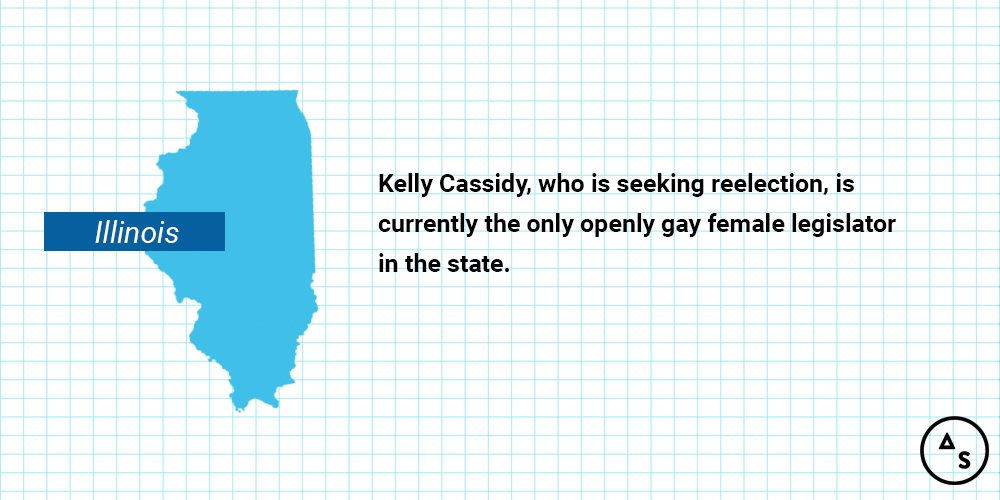
Kelly Cassidy
Illinois State House, District 14
Representative Kelly Cassidy, a Democrat, has been serving in the Illinois General Assembly since 2011, and is currently the only openly gay female legislator in the state (hopefully that number will increase with the election of Maggie Trevor, also on the ballot for this November!). She’s the former legislative director for the National for Organization of Women. She’s an outspoken advocate for reproductive rights, particularly the maintaining the right to an affordable and safe abortion – sharing her own personal experience. She’s also a proponent of common sense gun laws and gun control and last year propose the legalization of marijuana in Illinois. She has a wife (with whom she got engaged in front of the Illinois Statehouse back in 2013) and three sons.
Maggie Trevor
Illinois State House, District 54
Democrat Maggie Trevor is a proud graduate of the Rolling Meadows public school system and has family roots in the area dating back to the 1930s. She attend the University of Chicago, earning a bachelor’s degree in Chemistry and a master’s and PhD in Political Science. She completed a research fellowship at the Government Data Center at Harvard, and taught Political Science at the University of Iowa until she left academia in 1999. Since then, she has worked as a research and operations executive in the healthcare field. Therefore, it makes sense that health care is central to Trevor’s campaign platform. She’s also in favor of reproductive rights protection, gun safety, LGBTQ rights, and a constitutional amendment that would establish a graduated income tax. A decades long bicycle commuter and former liaison to the city’s traffic committee, Trevor would prioritize improving Illinois public transportation options and building infrastructure that is friendly to pedestrians and bicyclists.
Iowa
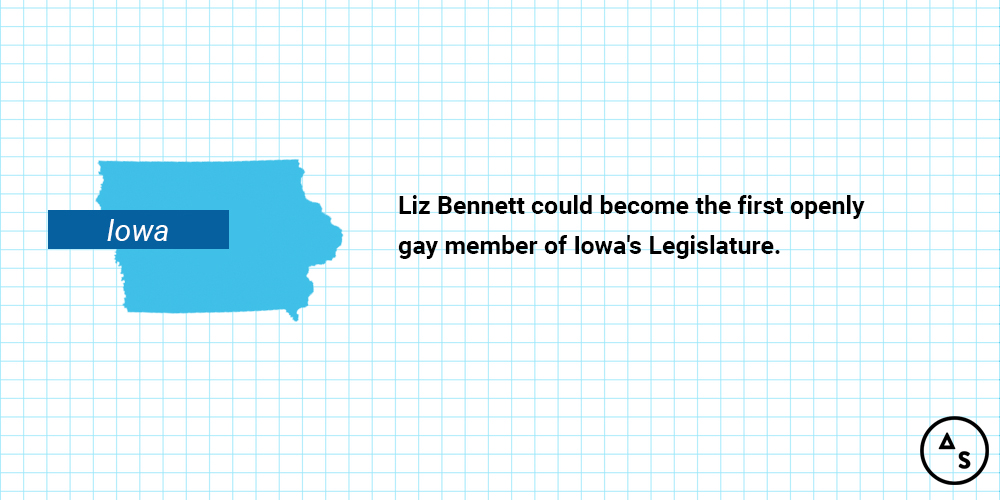
Liz Bennett
Iowa State House, District 65
Liz Bennett, who was first elected to the Iowa House of Representatives in 2014, is the first openly LGBTQ women to serve in the state legislature. Her main priorities are making sure Iowans have access to public education, clean water, and affordable healthcare. She’s also a proponent of mandating a federal minimum wage. In the general election, Bennett faces Republican George Olmsted, whose website lists four core beliefs, including: “Iowa can’t do anything about climate change. It’s a global problem.”
Kansas
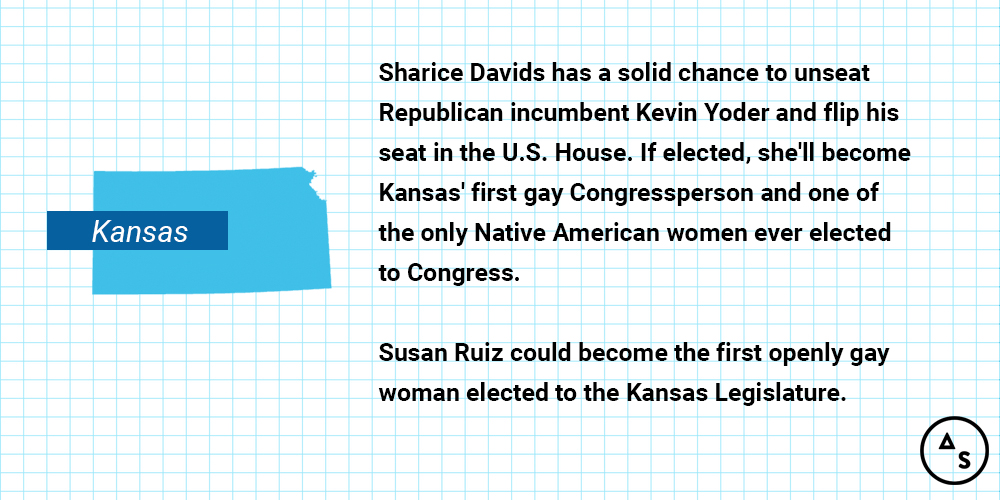
Sharice Davids
United States House of Representatives, Kansas District 3
Before primary results were even finalized, Sharice Davids’ Republican opponent in the Third District race launched the first general election attack against her. She’s not from around here, he said, she doesn’t know Kansas…as if Davids hadn’t grown up in Leavenworth or gotten her associate’s degree at Johnson County Community College in Overland Park or returned to Kansas after finishing law school. She’s doesn’t know our values, he said…a dogwhistle so loud, everyone could hear it.
Another GOP official dropped all pretense saying, the “radical socialist kick boxing lesbian Indian will be sent back packing to the reservation.”
Davids has perserved through all the dogwhistles, overcoming better financed candidates in the primary and outraising her Republican opponent in the general. On the campaign trail, she emphasizes improving access to health care, developing a tax structure that buoys the middle class and promotes job growth and revamping the immigration system. If elected, Davids and Arizona’s Deb Haaland will become the first Indigenous women to serve in Congress. If elected, Davids will be just the second out lesbian (along with Sen. Tammy Baldwin (D-WI)) and the first Native lesbian to serve in Congress.
Susan Ruiz
Kansas State House, District 23
Susan Ruiz is a second generation immigrant and a first generation college graduate whose parents “believed in raising a family of responsible citizens by teaching us the importance of our voting rights and getting involved with the community.” Ruiz has been a clinical social worker for most of her life, working with adults with severe mental illness, and decided to run for office after Trump’s election. She married her partner of 20 years one month before she passed away and is committed to making sure all LGBTQ people have their civil rights protected. Her other core issues are ending voter suppression, funding public schools, and expanding Medicaid under the ACA for all Kansas residents. If elected, Ruiz will be one of the first openly LGBTQ members of the Kansas Legislature.
Bonus Ballot Information
+ Democratic challenger Laura Kelly is in virtual tie in the polls with Republican Secretary of State Kris Kobach in Kansas’ governor’s race, with some polls giving her a slight edge. Kansas is one of five states locked in a toss-up gubernatorial race.
Maryland
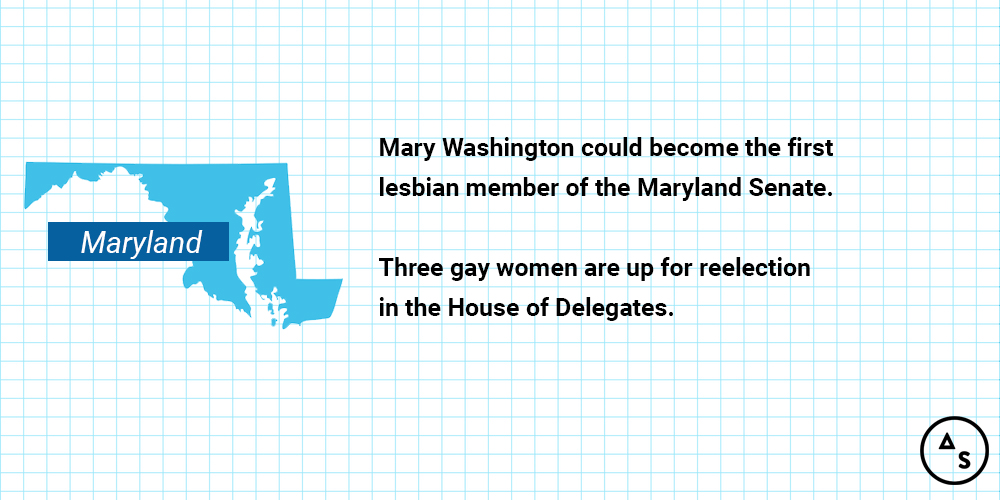
Bonnie Cullison
Maryland House of Delegates, District 19
Bonnie Cullison, Democrat, is up for re-election to the Maryland house of Delegates. A former special education teacher, her previous political career started with a teacher’s union. During her first term in office, she advocated in favor of establishing same-sex marriage in Maryland, and in June of 2013 she married her domestic partner of 30 years, Marcia Massey. In her previous work in the House, she was appointed a deputy majority whip in her first term and Chair of the Insurance subcommittee in her second. She is endorsed by NARAL Pro-Choice America, and her priorities moving forward include enacting healthcare protections for consumers, improving education, and securing the environment.
Anne Kaiser
Maryland House of Delegates, District 14
Anne Kaiser is a democratic candidate up for reelection to the House of Delegates in Maryland. She is currently the chair of the Ways and Means committee. A D.C-born local who grew up in Maryland, she has coached youth basketball throughout her political career and has been active in many community organizations, including in the inaugural class of the Howard P. Rawlings Leadership Fellowship Program and the Girls in Information Technology Taskforce. Has won eight awards, including Out for Equality award from Equality Maryland and Legislator of the Year from three different organizations. Some legislative notes that may be of interest: she voted for the Healthy Air Act in 2006 (SB154) and in favor of in-state tuition for undocumented immigrants in 2007. During the 2004 legislative session, Kaiser testified on behalf of the Medical Decision-Making Act (H.B. 1284), announcing that she is a lesbian during her testimony. She is now married to her longtime partner Nancy C. Lineman, with whom she lives and shares a dog.
Maggie McIntosh
Maryland House of Delegates, District 43
Maggie McIntosh is a Democrat up for reelection to the Maryland House of Delegates. She is the outgoing Chairman of the Environmental Matters Committee and incoming Chairman of the Appropriation Committee. A former Baltimore City Public School teacher, she was a co-sponsor of Marriage Equality legislation and the first openly gay elected member of the Maryland General Assembly. She is also the first woman to be appointed majority leader in the Maryland House of Delegates and the first woman to serve as the chairman of the Environmental Matters Committee. She is endorsed by NARAL Pro-Choice Maryland. She lives in North Baltimore with her wife, Diane Stollenwerk, and two Labrador retrievers.
Mary Washington
Maryland State Senate, District 43
Mary Washington is a Democrat for the Maryland State Senate. She comes from academia, formerly a professor at Lehigh University and research fellow at the University of Pennsylvania. She has worked for government agencies in Maryland, including the Maryland Secretary of State’s office and the Baltimore Housing Authority, as well as nonprofit organizations including serving as an associate director with the Parks & People Foundation in Baltimore. Washington also served on both the House Appropriations Committee and the House Ways and Means Committee. She is one of only two African American lesbians to serve in a state legislature, making her (in 2010) the first openly LGBT African-American elected official in Maryland, and the second in the country.
Massachusetts
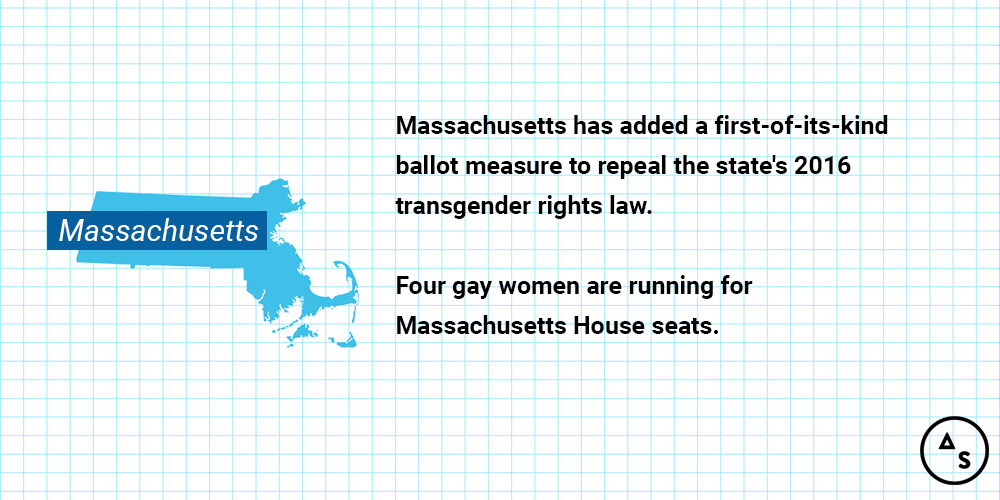
Kate Hogan
Massachusetts State House, Third Middlesex District
Kate Hogan was elected to the Massachusetts House of Representatives in 2008 and is running unopposed in the general election after winning her primary with 92% of the vote. Hogan introduced a variety of bills during Massachusetts’ last legislative session, including bills aimed at enhancing support for seniors; teasing the burden of agriculture estate taxes; ensuring access to safe, affordable healthcare; criminalizing sexual assault by medical professionals; funding libraries; and fairer access to vital records for LGBTQ people. Hogan has been with her partner, Dr. Susan Vick, for 26 years.
Elizabeth Malia
Massachusetts State House, Eleventh Suffolk District
Elizabeth Malia was elected to the Massachusetts House in 1998. She won the Democratic primary in May with 66% of the vote and is running in the general election unopposed. As well as serving on the Joint Committees on Labor and Workforce Development, and Public Service, she is the Assistant Vice Chair of the Committee on Ways and Means. During her tenure, Malia has made a name for herself championing women’s health, LGBTQ equality, immigrant rights, and affordable healthcare. She co-founded the Bay State Gay and Lesbian Democrats in the mid-’80s.
Tanya Neslusan
Massachusetts State House, First Hampden District
Tanya Neslusan is running for office for the first time. If elected, she will be the first openly LGBTQ lesgislator to server her district (and will join five other openly gay legislators in the Massachusetts House of Representatives). Neslusan is a lifelong social justice activist whose platforms include protecting LGBTQ rights, ensuring access to affordable healthcare, funding public transportation, and job development. She is challenging Republican incumbent Todd Smola.
Sarah Peake
Massachusetts State House, Fourth Barnstable District
Sarah Peake was first elected to the Massachusetts House of Representatives in 2006. She won her primary unopposed and is running in the general election unopposed. Peake practiced law in New York before she and her wife moved to Provincetown and bought a bed and breakfast, which they ran for 23 years. In the Massachusetts House she has served as Third Division Floor Leader, Chair of the RTA caucus, and Chair of the Joint Committee on Municipalities and Regional Government and Joint Committee on Tourism, Arts and Cultural Development.
Bonus Ballot Information
+ Massachusetts Question 3 is a first-of-its-kind effort to repeal the state’s 2016 transgender rights law. A yes vote “supports upholding Senate Bill 2407, a bill to prohibit discrimination based on gender identity in public places—such as hotels, restaurants, and stores.”
Michigan
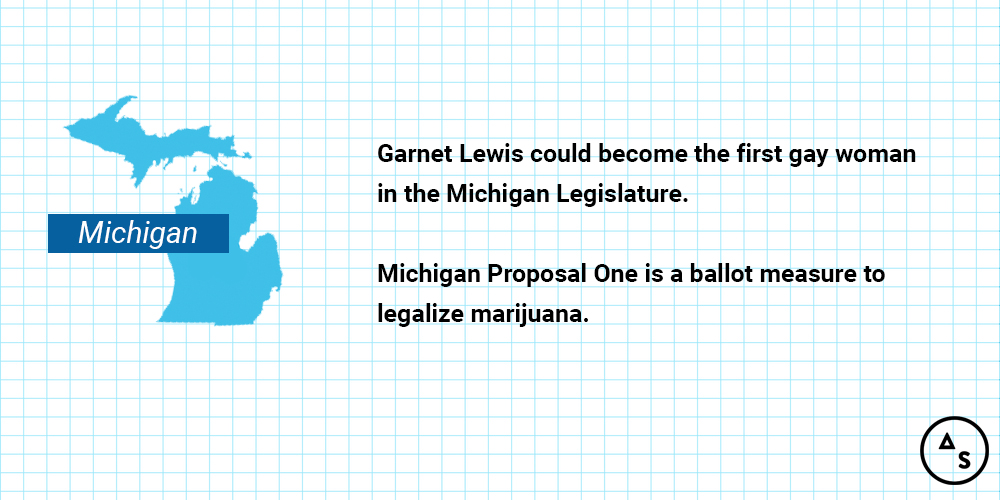
Garnet Lewis
Michigan State Senate, District 26
Garnet Lewis is a retired educator and a member of the City of Saugatuck Planning Commission and a member of the City of Saugatuck Board of Review. She’s running for an open seat in Michigan’s 26th district. Her priorities include protecting Michigan’s waterways, restoring the Great Lakes, fulling funding public education, implementing single-payer healthcare, and investing in state infrastructure. If elected, she would be the only openly LGBTQ member of Michigan’s senate.
Bonus Ballot Information
+ Michigan Proposal One is a ballot measure to legalize marijuana. A yes vote “supports legalizing the recreational use and possession of marijuana for persons 21 years of age or older and enacting a tax on marijuana sales.”
Minnesota
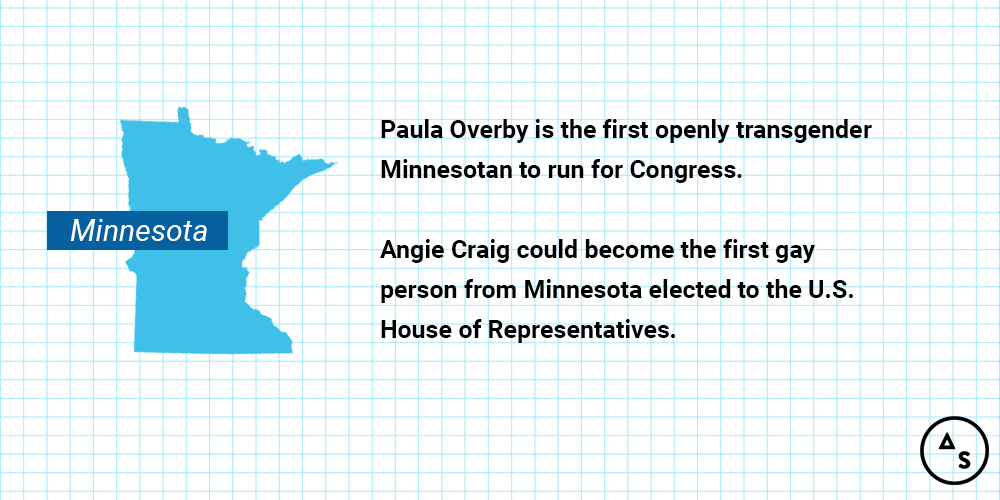
Paula Overby
United States Senate, Minnesota District 2
Paula Overby is the first openly transgender Minnesotan to run for Congress. She’s the Green Party candidate for the U.S. Senate. She’s a graduate from the University of Minnesota with a dual-degree in psychology and computer science, and a full time working mother of three. She left the two-party political system in 2014 and has felt energized as an independent to reform the political process to look beyond the legacy of wealth that undermines both Democrats and Republicans. She wants to be an advocate for working class Minnesotans. She opposes gerrymandering and endorses public funding for elections. She’s in favor of student loan debt forgiveness and universal healthcare. She’s interested in converting current military overspending into social investments. She would also like to see greater cyber security and protection of citizens’ privacy from corporations online.
Angie Craig
United States House of Representatives, Minnesota District 2
Back in 1997, Angie Craig and her then-partner tried unsuccessfully to conceive a child through a donor so they began exploring the adoption process. They met a young woman who agreed to give up her child but only Craig’s partner would be listed as the adoptive parent, Craig would be legally dubbed, the “roommate.” Joshua was born on Christmas Day but, due to family pressure, the young woman rescinded her offer and Craig and her partner weren’t able to take their little boy home. For the two years that’d follow, Craig and her partner would be embroiled in an intense legal battle whose ruling would pave the way for same-sex adoption.
Joshua’s 20 years old now and Angie Craig’s fight to become his mother is a testament to her tenacity…and she’s promised to put that same fighting spirit to work on behalf of Minnesota’s Second District. Her campaign is focused on making healthcare coverage more accessible and more affordable and creating an economy that works for everyone.
Missouri
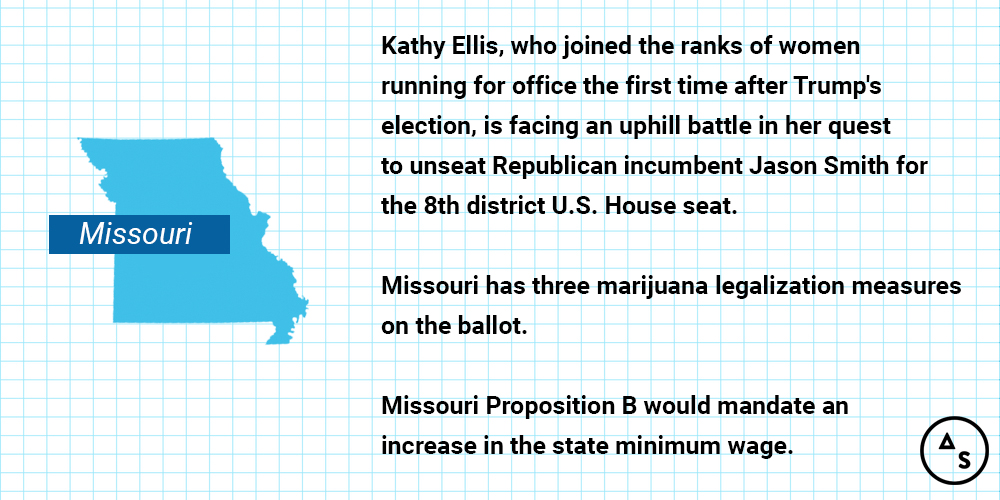
Kathy Ellis
United States House of Representatives, Missouri District 8
After winning the primary in August, Kathy Ellis is facing off against Republican incumbent Jason Smith in the general election. Ellis joins the ranks of women who made the decision to run for office after the 2016 election. She is a clinical social worker and her philosophy of governing mirrors that of her lifelong profession: “The success of any country is not the result of how much money it has or how big the artillery of its armed forces is, but how it treats those who suffering, disenfranchised, elderly, poor, sick and vulnerable.” Her wife, Ann, is a high school science teacher.
Patrice Billings
Missouri State Senate, District 2
Patrice Billings served 28 years with the Billings Police Department where she was the first female police officer in the country to become a helicopter pilot for a law enforcement agency. She earned Purple Heart during her tenure. Now she is a small business owner. Patrice’s priorities include job creation, ensuring access to affordable healthcare, reproductive justice, common sense gun control, and investing in early childhood learning.
Bonus Ballot Information
+ Democratic incumbent Claire McCaskill is facing tough opposition from her Republican opponent, Josh Hawley. She’ll need solid voter turnout to hang onto her Senate seat.
+ Missouri Amendment 2 is a ballot measure seeking to legalize medical marijuana via constitutional amendment. A yes vote “supports this constitutional amendment to: legalize marijuana for medical purposes; tax marijuana sales at 4 percent; and spend tax revenue on healthcare services for veterans.”
+ Missouri Amendment 3 is a ballot measure to legalize medical marijuana via constitutional amendment. A yes vote “supports this constitutional amendment to: legalize marijuana for medical purposes; tax marijuana sales at 15 percent; and spend tax revenue on a Biomedical Research and Drug Development Institute.”
+ Missouri Proposition C is a ballot measure to legalize medical marijuana via initiated state statute. A yes vote “supports this initiated statute to: legalize marijuana for medical purposes; tax marijuana sales at 2 percent; and spend tax revenue on veterans’ services, drug treatment, education, and law enforcement.”
+ Missouri Proposition B would raise the minimum wage. A yes vote “supports increasing the state’s minimum wage each year until reaching $12 in 2023 and then making increases or decreases based on changes in the Consumer Price Index.”
Montana

Amelia D. Marquez
Montana State House, District 52
Amelia Marquez is a trans Latina Democrat running for Montana’s 52nd House District. She cites bell hooks as one of her biggest inspirations, telling The Montana Post, “One of the biggest problems of our time is the imperialist, white supremacist, capitalist, patriarchy that has passed through generation after generation.”
Marquez advocates for a $15 minimum wage and tuition-free higher education. She’s also interested in exploring the possibility of legalizing recreational marijuana and using the tax from the product in support of public education. A believer in climate change, but also sensitive to the needs of Montana’s working families, she’d like to offer retraining for those who rely on coal and oil industry jobs to clean energy work that pays a living wage. Two of the issues of prominent concern for Marquez are the rising domestic violence rates in Billings and the sprawling food dessert on Billing’s South Side (the neighborhood she grew up in). If elected, she’ll tackle both of those causes with fervor. Born and raised in Billings, Montana, Marquez also helps her parents with raising her foster siblings in her spare time.
Kim Abbott
Montana State House, District 83
Kim Abbott, a Democrat, hopes to take the passion she’s brought to her years of work at nonprofits to the state Legislature in her bid for re-election. She currently serves as the co-director of the Montana Human Rights Network, and touts her efforts to ensure public schools are well funded, raising wages for the lowest-paid workers through the Raise Montana campaign, and increase access to healthcare through the Healthy Montana Kid’s program and Medicaid expansion. She lives in Helena with her partner, Tara.
Andrea Olsen
Montana State House, District 100
Andrea Olson was first elected to the Montana House of Representatives in 2014. She is running in the general election unopposed. During her time in the Montana House, Olson has focused on quality education, job creation, affordable healthcare, clean air and water, and access to healthy, locally-grown food. She scored a perfect 100 percent Montana Conservation Voters rating during her first two sessions.
Bonus Ballot Information
+ Montana I-185 would expand Medicaid via funding by an increase in tobacco taxes. A yes vote “supports the ballot initiative to extend expanded eligibility for Medicaid coverage and raise taxes on tobacco products to fund Montana’s Medicaid expansion programs (which would otherwise expire on June 30, 2019) as well as other healthcare-related programs.”
Nebraska
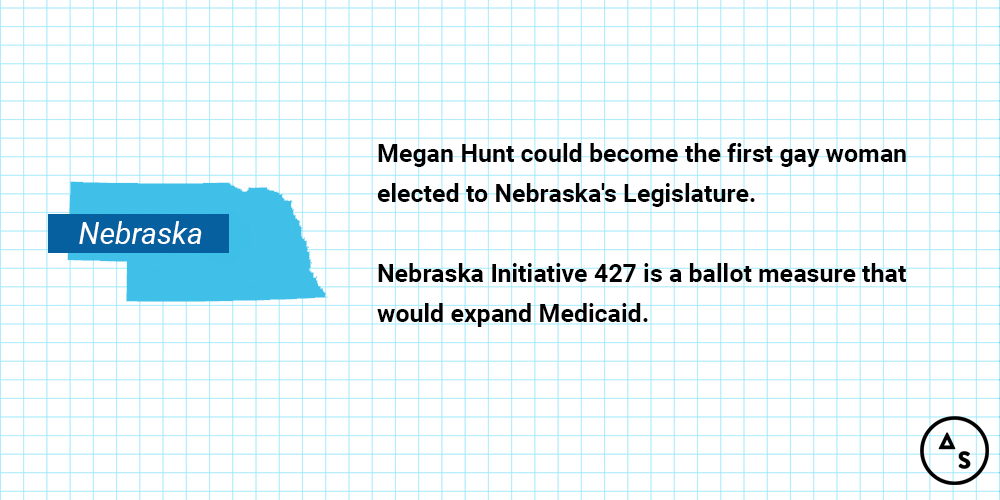
Megan Hunt
Nebraska Legislature, District 8
Nebraska’s District 8 election is taking place between two women who are both Independents. If Megan Hunt wins, she will be the first openly LGBTQ to serve in the state legislature. Hunt’s platforms include a focus on human rights, reducing brain drain in Nebraska as minorities flock to more urban areas in other states, well-funded public education, ending mass incarceration, legalizing marijuana, and mandating LGBTQ protections.
Bonus Ballot Information
+ Nebraska Initiative 427 would expand Medicaid. A yes vote “supports this initiative to require the state to provide Medicaid for persons under the age of 65 and with incomes equal to or below 138 percent of the federal poverty line.”
Nevada
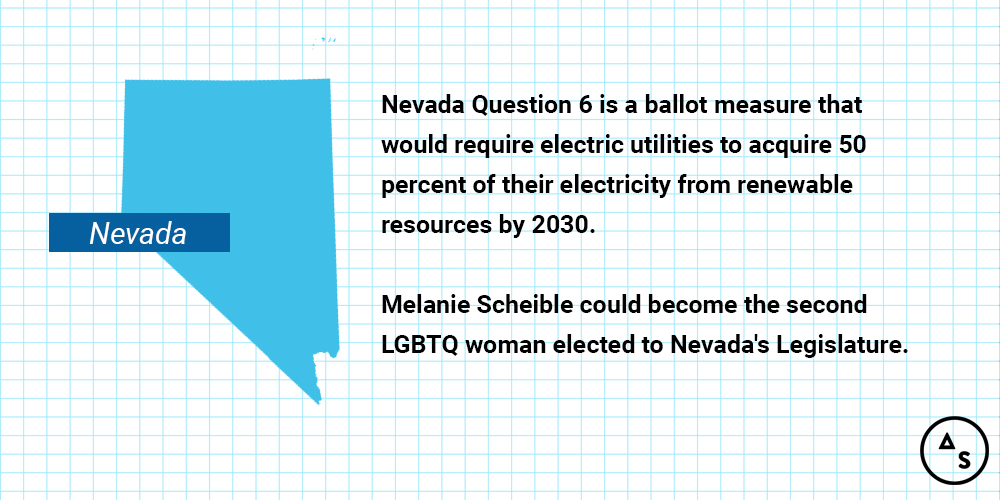
Melanie Scheible
Nevada State Senate, District 9
Melanie Scheible is running in a really close race for the state senate seat in district nine. She’s a Nevada public school grad who received her BA from Stanford and her law degree from Columbia, after which she moved back to Las Vegas to work in public service. She has served on the Steering Committee for the Human Rights Campaign and has handled hundreds of cases working as a prosecutor for the Clark County District Attorney. Her priorities include funding public education, increasing access to affordable healthcare, gun control and job creation.
Bonus Ballot Information
+ Nevada Question 6 is a Renewable Energy Standards Initiative. A yes vote “supports this initiative to require electric utilities to acquire 50 percent of their electricity from renewable resources by 2030.”
+ Democratic challenger Jacky Rosen is in a toss-up race to flip Republican incumbent Dean Heller’s senate seat. Polls have each of their chances at 50%.
New Hampshire
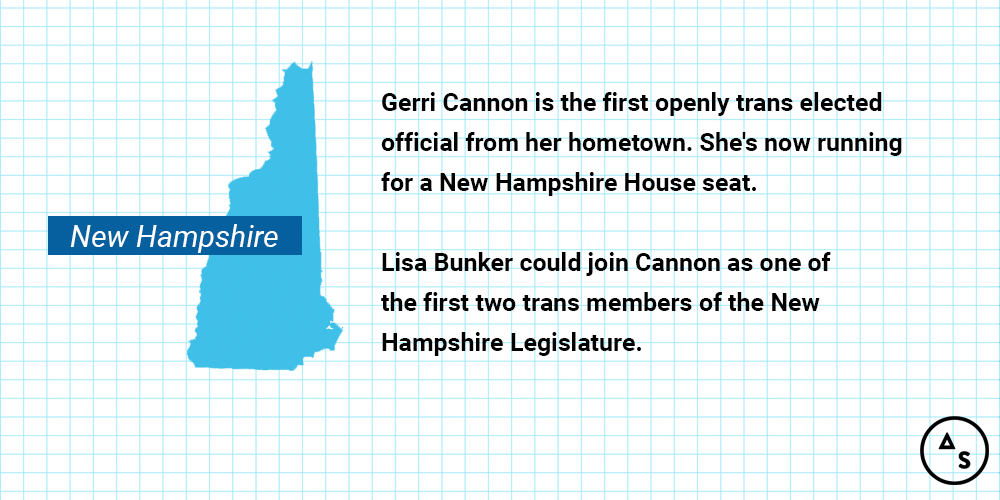
Gerri Cannon
New Hampshire State House, District Strafford 18
Gerri Cannon is the first openly transgender elected official from her hometown. She is a former professional truck driver, school board member, and small business owner. She’s been an independent lobbyist for ten years, seeking to improve the lives of trans people in New Hampshire. If elected, she plans to fight for better funded public education, affordable and accessible healthcare, and immigrant rights.
Lisa Bunker
New Hampshire State House, Rockingham 18
Lisa Bunker is a full-time writer who spent three decades in public broadcasting. She decided to run for office after Trump was elected. Her priorities include advocating for the rights and protections of minorities, fixing the opportunity gap, and creating sustainable stewardship practices around the environment. If elected, she and Gerri Cannon would be the first two trans people to serve in the New Hampshire Legislature.
New York
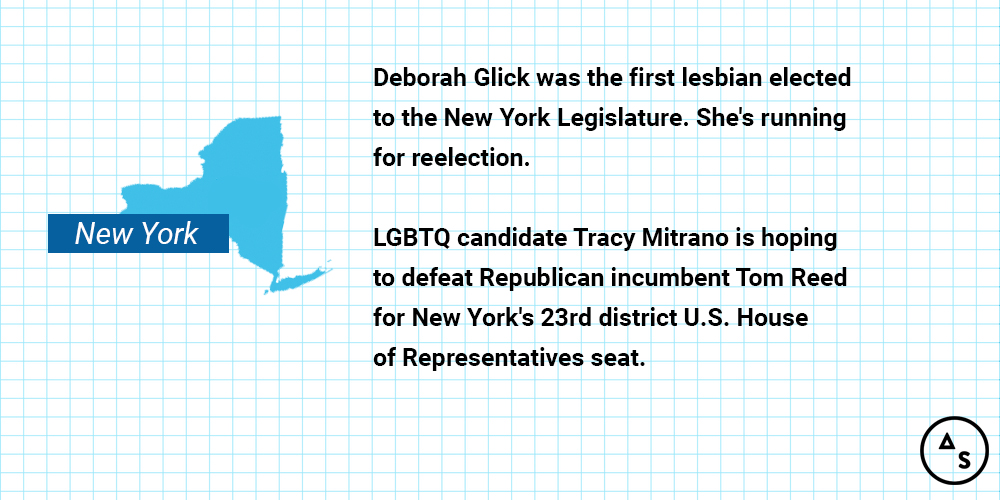
Tracy Mitrano
United States House of Representatives, New York District 23
After winning the Democratic primary in a nail biter, Tracy Mitrano is one of the only queer women running for a seat at the federal level in 2018, facing off against four-term Republican incumbent Tom Reed in the general election for a seat in the U.S. Congress. Reed, whose “Trump Score” — meaning the percentage of times he’s voted with Trump — hovers around 97%, has taken to calling Mitrano the “Extreme Ithaca Liberal.” Trump even tweeted to thank Reed, specifically, for his support earlier this fall. Mitrano has used that to her advantage, especially in the liberal college towns that pepper the 23rd District. If she’s elected, she’ll be one of the only openly bisexual members of the U.S. House of Representatives.
Deborah Glick
New York State Assembly, District 66
Deborah Glick is a Democrat running for the New York State Assembly. A lifelong New Yorker and former production supervisor for Steinway Pianos, she is the first openly lesbian or gay member of the New York State legislature. She is a strong advocate for choice, helping to codify Roe vs. Wade into New York state law. While Glick’s track record on LGBTQ rights is solid — In 2008, she co-sponsored a bill allowing same sex marriage; in 2002 she helped pass SONDA, the Sexual Orientation Non-Discrimination Act; in 2004 she passed her Hospital Visitation Bill, providing domestic partners the same rights that as next-of-kin — it is not as stellar in other areas. She and fellow Assembly members drew criticism from disability advocates over legislation that would allow people with disabilities to control their own healthcare and allow disabled New Yorkers to live in their own homes instead of nursing facilities. If she is reelected, it’d be good to put community pressure on her to do better for the disabled community of New York.
North Carolina
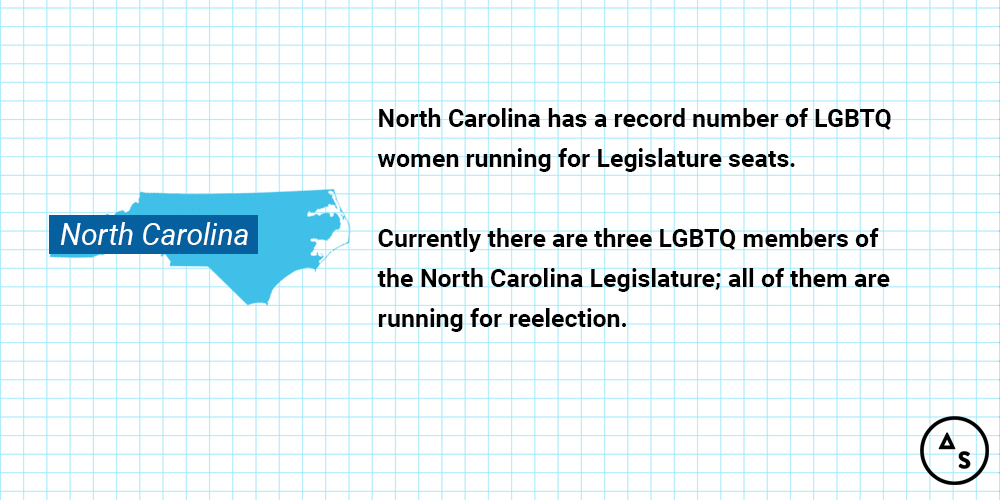
Deb Butler
North Carolina State House, District 18
When Deb Butler moved back to North Carolina in 1992, she settled in Wilmington and built a small law practice in the town’s downtown corridor. This year, thanks to Hurricane Florence, that same downtown corridor found itself deluged by flood waters and battered by historic winds. In order to rebuild and restore Wilmington’s vibrant downtown — and areas all across Southeast North Carolina — District 18 needs the experienced leadership of Deb Butler in the General Assembly.
Since her legislative appointment, Butler has been vocal about the environmental threat posed to the region’s water supply, undettered by Republican efforts to stifle her. Her voice is especially needed now that Florence has only exacerbated that threat. Post-Florence, Butler has also pressured FEMA to be proactive in addressing the area’s unique emergency housing challenges, saying, “I don’t want anybody in my district falling through the cracks.”
District 18 needs that spirit back in the NC House.
Allison Dahle
North Carolina State House, District 11
Allison Dahle wasn’t supposed to win the District 11 primary. She was a political novice, in a crowded primary, facing an incumbent, one of the Democratic Party’s rising stars, but Dahle wanted a debate on the issues. She wanted her perspective — as a woman, as a lesbian, as an advocate for people with disabilities — on the record. Then the unexpected happened: the aforementioned Rising Star faced accusations of sexual misconduct and the Party’s leadership abandoned him, while Dahle’s other opponent dropped out of the race for personal reasons; all of a sudden, the longshot became the frontrunner and, eventually, the nominee.
Dahle is taking full advantage of the opportunity she’s been given by putting forth a platform of progressive ideas to move her district forward. She’s championing a living wage, increased investment in high quality public transportation and working-class centered tax reform to help build a fairer economy. Dahle is committed to expanding Medicare, protecting Planned Parenthood and creating more affordable options for health care. She’s pledged to work across the aisle to get things done and to speak out whenever elected officials — be they Republican or Democrat — run afoul of North Carolina values.
Marcia Morey
North Carolina State House, District 30
Time and time again, North Carolina Republicans have used their supermajority in the legislature to consolidate power and, time and time again, the Courts have stepped in and rebuked these unconstitutional power grabs. Now, because Republicans can’t win on the merits, they’ve taken aim at restructuring the Courts. This abuse of power by the GOP-led legislature — this fundamental disdain for one of the bedrock principles of state governance, the separation of powers — is what led Maria Morey to give up her seat as a District Court judge in Durham County to become an advocate for an independent judiciary in the NC House. Her voice and her experience is desperately needed in a legislature prone to overreach.
Morey’s also worked to develop common sense solutions to gun violence: she’s the lead sponsor of HB976, a bill that would grant judges the ability to remove guns from people who’ve exhibited “threatening, erratic or dangerous behavior.” According to Morey, legislation like this could “thwart future tragedies as it provides for people who ‘see something’ to have the power not only to ‘say something’ but …’do something’.” Her advocacy has earned her the endorsement of Moms Demand Action for Gun Sense in America.
Marcia Morgan
North Carolina State House, District 19
Marcia Morgan’s entire career has been about public service. First, as an educator — teaching at every level, from Head Start to University — and then as a member of the US Army. After 25 years of service to the nation, Morgan’s earned the right to retire to Carolina Beach but instead, she’s seeking to represent that area in the NC legislature. Frustrated by the lack of leadership in Raleigh, particularly on the issue of water contamination, Morgan will challenge a Republican incumbent who’d gone unopposed in the last two election cycles.
Her campaign has identified four areas of focus: environment, education, economy and equality. She wants to see North Carolina step up its protection of the state’s waterways — especially demanding accountability from industrial and agricultural polluters — and ensure that the coastline remains free of offshore drilling rigs. Morgan wants to reinvest in public schools and build a strong economy that works and welcomes all people.
Robyn Pegram
North Carolina State House, District 36
Ten years ago, Robyn Pegram was a high school student who was forced out of the closet, after some classmates in whom she’d confided, began spreading rumors about her at school. Today, she’s running for a slot in the North Carolina legislature, in the same district where she was outed, as a proud out lesbian, galvanized by ineffectual leadership by Democrats on HB142, the so-called bathroom bill compromise. At the heart of her campaign: a pledge to put people ahead of politics. She advocates giving parents more control over their child’s education and their family’s health care and reducing regulation and licensing requirements to encourage competition and innovation.
Linda Bennett
North Carolina State House, District 26
For the first time ever, NC Democrats fielded opponents in each and every legislative district in the state; not a single Republican State Senator or member of the House will have their record go unchallenged, including in Johnston County’s 26th District. Linda Bennett hopes to bring her entrepreneurial spirit to the legislature and change the way North Carolina does business.
Her experience managing multi-million dollar budgets and building her own business have taught Bennett that “jobs follow talent” and the best way to develop that talent is to invest in education. If elected, she pledges to build a long-term education strategy, coupled with sustainable funding, that including pre-K education and expanding vocational training to ensure that every student graduates with a job skill or college credit. She’s also committed to raising teacher pay to the national average and reinstating incentive packages for advanced education and length of service.
Bonnie Dawn Clark
North Carolina State House, District 77
Like many of the LGBT candidates running for office in North Carolina, Bonnie Clark was spurned to action by House Bill 2, the anti-trans “bathroom bill” that passed in 2016. Clark was astounded by the hypocrisy of supposed “small government conservatives” who interjected North Carolina law into the most private of spaces. North Carolina was better than this, Clark knew, and her activism led to this campaign and a determination to return the power in state government to the people.
Clark’s platform includes working to secure affordable, accessible healthcare for all North Carolinians and restoring the state’s once grand public education system. She is a big proponent of legalizing cannabis, as an avenue to economic growth and a way to reduce the threat posed by the opioid epidemic. Clark pledges to protect the rights of all North Carolinians while holding corporations accountable for their transgressions, pollution and corruption.
North Dakota
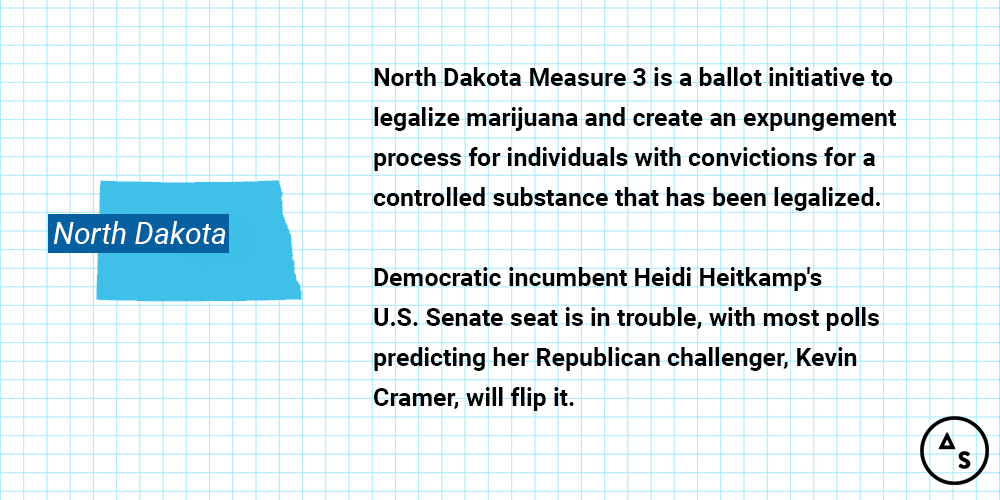
Bonus Ballot Information
+ North Dakota Measure 3 would legalize marijuana and create an expungement process. A yes vote “supports the ballot initiative to legalize the recreational use of marijuana in the state of North Dakota for people 21 years of age or older and create an automatic expungement process for individuals with convictions for a controlled substance that has been legalized.”
+ Democratic incumbent Heidi Heitkamp‘s Senate seat is in trouble, with most polls predicting her Republican challenger, Kevin Cramer, will flip it. Heitkamp needs major voter turnout to hold onto her seat.
Ohio
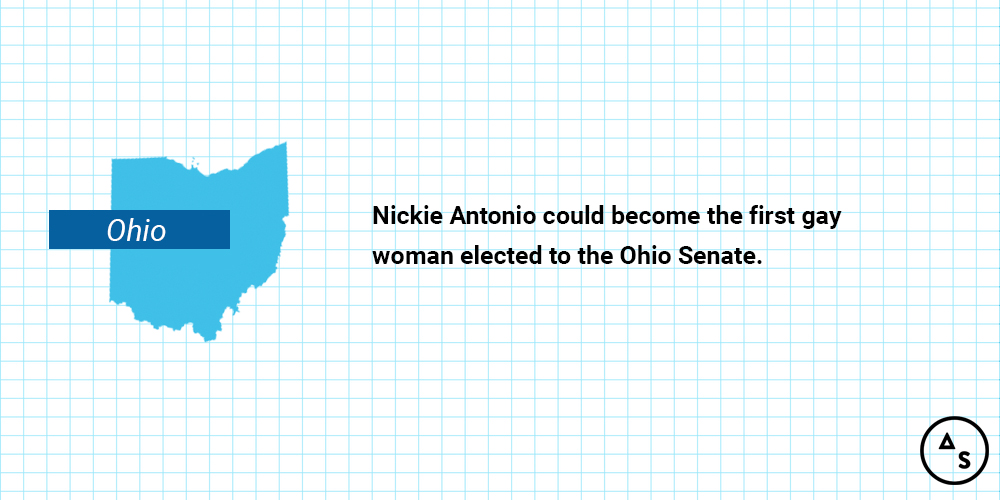
Nickie J. Antonio
Ohio State House, District 13
Nickie J. Antonio is a Democrat running for the Ohio State House. She is a former special education teacher, adjunct professor, and non-profit administrator, as well as a former chair of the Cuyahoga Democratic Women’s Caucus. She comes with a lot of experience, winning her first at-large seat in 2005. She was re-elected in 2009 with the most votes in a field of six candidates, chasing three seats. In the 129th General Assembly, she served on five committees, including Education as a Ranking Member). She also serves on several task forces. She is the first openly gay person to have served in the Ohio General Assembly, and a long-time advocate of same-sex marriage rights. After a 21 year engagement, in 2013 she was finally able to marry her wife Jean Kosmac, and they now have two daughters.
Oklahoma
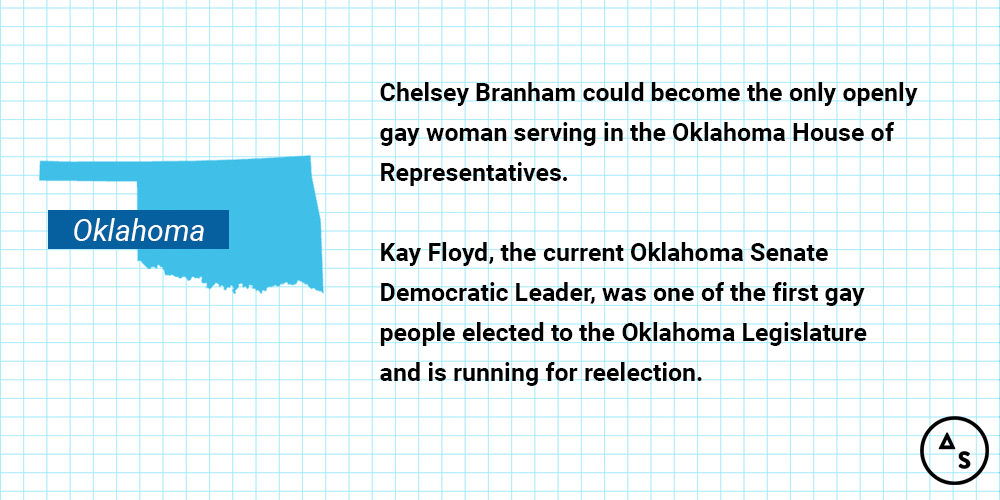
Chelsey Branham
Oklahoma State House, District 83
Chelsey Branham easily won her primary election and is facing off against a Republican challenger in a seat with no incumbent. She’s a Native Chickasaw and the Director of the Social and Economic Justice at the Oklahoma City YWCA. Her focus is on empowering women and tearing down racism, which she plans to do through legislating progressively on education, criminal justice reform, and healthcare. If she wins, she’ll be the only openly LGBTQ member of the Oklahoma House of Representatives.
Kay Floyd
Oklahoma State Senate, District 46
Kay Floyd is a Democrat running for reelection to the Oklahoma State Senate. She is currently the Senate Democratic Leader. Her previous experience is as a judge, preciding over the Special Municipal Court and State Administrative Law. She has also served as a processor at Oklahoma State University and as an attorney helping senior citizens with legal aid. She is the first openly lesbian and second LGBTQ (after Sen. Al McAffrey) representative elected to the Oklahoma legislature.
Oregon
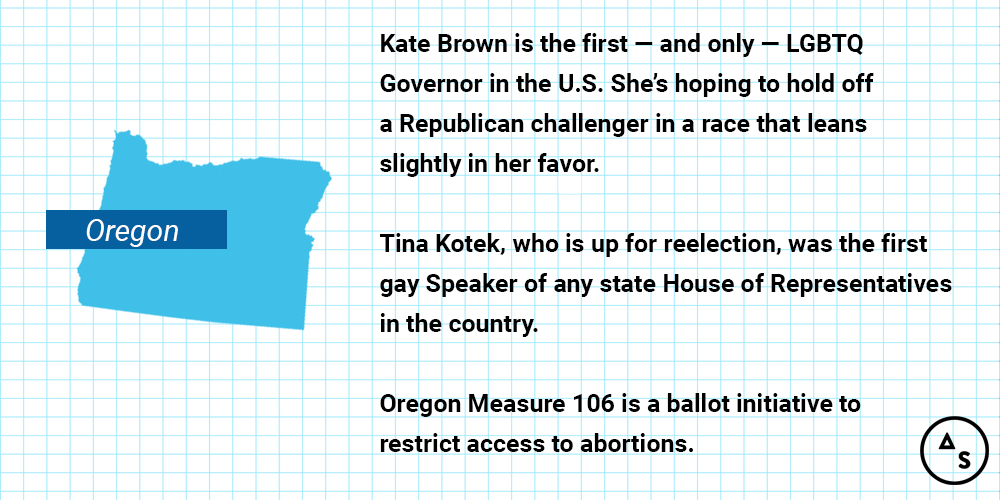
Kate Brown
Governor
Kate Brown, a Democrat, is seeking re-election as Oregon’s 38th governor. In 2016, she ran openly as a bisexual woman and became the first openly LGBTQ person to be elected governor of a state. She served as the Oregon Secretary of State from 2009 to 2015, and has her degree and certificate in Environmental Law from Lewis and Clark’s Northwestern School of Law. In 2015, she stepped into the role of governor after Gov. John Kitzhaber resigned in scandal, and was elected to the job a year later. Brown wants to make Oregon a leader in battling climate change, and wants better access to more affordable healthcare for Oregon residents. She is married to Dan Little, who has grown children.
Jamie McLeod-Skinner
United States House of Representatives, Oregon District 2
Back in 2017, Jamie McLeod-Skinner took her mother-in-law to town hall, hosted by their Congressman in Baker City. When a constituent asked about protecting people with pre-existing conditions, the Congressman promised he would. A short time later, the Congressman went back to Washington — the top recipient of donations from the health/pharmaceutical industry — and pushed legislation that’d eliminate coverage for people with pre-existing conditions. He’d lied to his constituents. It was at that moment that McLeod-Skinner realized that she had to do more and decided to run against that Congressman.
McLeod-Skinner will bring change to Washington, rather than being changed by Washington, as her Republican opponent has. She believes that government works best “in partnership with other sectors of our society to provide the physical and social infrastructure necessary for folks to care for their families and communities.” To that end, her platform advocates for equal access to affordable, comprehensive, high-quality health care and bolstering the economy through trade and investments in clean energy and technology. Her appeal extends beyond Democratic voters, as her bid has earned the endorsements of Oregon’s Working Families Party and Independent Party.
Karin A. Power
Oregon State House, District 41
Karin A. Power is a Democrat running for Oregon State House. She is currently serving in the Oregon House of Representatives as well as working as a lawyer. She’s passionate about being on the ground in her community: she holds “constituent coffees” on the second Saturday of most months, encouraging people to join her for coffee and conversation. During her time as a representative, she helped pass the strongest reproductive healthcare bill in the country, helped Oregon become the first state to pass gun violence prevention legislation after Parkland, and increased the K-12 education budget by 11%. Looking forward, she wants to push for more fully-funding Oregon schools, put in place stronger tenant protections, and pursue more aggressive climate action to protect Oregon’s natural beauty. Power calls herself “Oregon’s youngest legislator-mom,” raising her child Grady with her wife, Megan Elston, and two dogs.
Tina Kotek
Oregon State House, District 44
Tina Kotek was first elected to the Oregon House of Representatives in 2006. In 2016, she became the first openly lesbian speaker of any state legislature in the world. During her tenure, she has fought for a progressive redesign of the state’s welfare system, established statewide nutrition standards for food sold in schools, and crafted legislation to end discrimination based on gender and sexual orientation. She and her wife Aimee have a Yorkie named Rudy (like the football player).
Bonus Ballot Information
+ Oregon Measure 106 would restrict access to abortions. A no vote “opposes the ballot initiative to prohibit public funds from being spent on abortions in Oregon, except when medically necessary or required by federal law.”
Pennsylvania
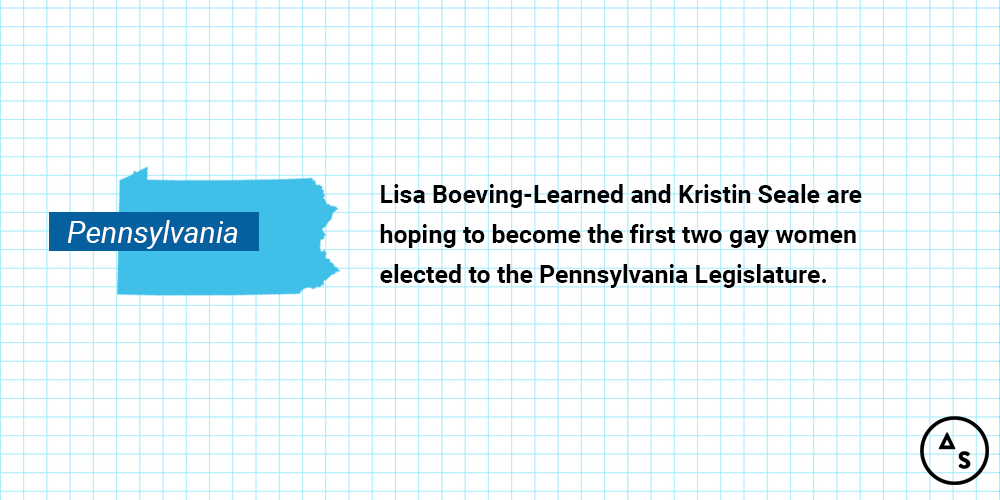
Lisa Boeving-Learned
Pennsylvania State House, District 8
Lisa Boeving-Learned is a Democrat seeking to represent District 8 in the Pennsylvania House of Representatives. Boeving-Learned is a former service member of the U.S. Army and a retired police sergeant. During her 25 year career as a police officer Boeving-Learned purposefully took assignments that allowed her to work directly with the citizens in her community – such as developing community partnerships to better serve the needs of the homeless and developing outreach support for survivors of domestic violence. In the wake of the 2016 election, Lisa Boeving-Learned once again felt a call to serve her community and uphold values of compassion, cooperation, and commitment. Her platform prioritizes universal healthcare, a higher minimum wage, better jobs & infrastructure, strong public schools, and putting an end to political gerrymandering. She lives with her wife, also a retired police officer, in Mercer County.
Kristin Seale
Pennsylvania State House, District 168
If elected, progressive Democrat Kristin Seale hopes to convene the first LGBTQ Legislative Caucus in the PA General Assembly. She’s running to represent the 168th district, which, despite being populated by 52% women, has never had a woman represent them in state legislature. A proud, out queer candidate, Seale supports Medicare for All, increasing state funding for K-12 education, tuition-free college and trade training, and raising the minimum to $15 an hour. She’s in favor of creating strong, common sense gun laws that would mimic the licensing, registration, and insurance requirements that Pennsylvania already has in place for car ownership. She’s a long time activist fighting against the Sonoco Mariner East II pipeline and is also against political gerrymandering. She’s currently serving in an elected position on the Rose Tree Media School Board of Directors. Seale’s a founder of two successful nonprofit women’s sports organizations and has been endorsed by President Obama.
Rhode Island
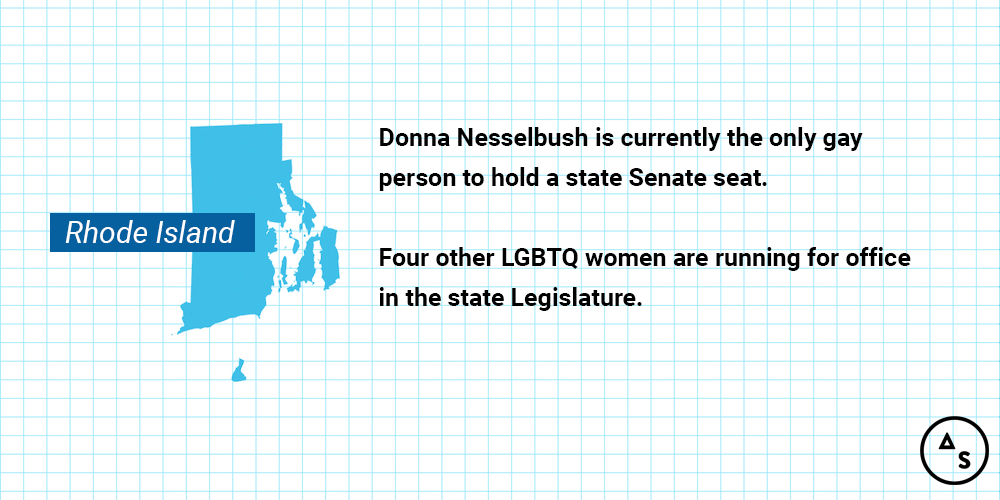
Rebecca Kislak
Rhode Island State House, District 4
After handily winning her primary, Rebecca Kislak is facing off against Independent Aryeh Yisrael Rosenfield in the general election. Kislak is an attorney who has a lifelong record of championing economic, racial, and reproductive justice. Her priorities include preventing climate crisis, investing in public education, fostering an economy that supports small businesses, increasing access to affordable healthcare, and regulating gun safety. Until stepping down to run for office, she was president of Rhode Island’s National Organization for Women. She lives with her wife, Dr. Joanna Brown, and their two children.
Donna Nesselbush
Rhode Island State Senate, District 15
Donna Nesselbush was elected to the Rhode Island Senate in 2010 and is running in this general election unopposed. She’s the only openly LGBTQ senator in the Rhode Island state legislature. Her signature platforms have included women’s rights, LGBTQ rights, animal rights, the environment, education, and healthcare.
Deb Ruggiero
Rhode Island State House, District 74
Deb Ruggiero was first elected to the Rhode Island House of Representatives in 2008. She currently serves as Deputy Majority Leader, Chairwoman of the House Committee on Small Business, and Chairwoman of the House Finance Subcommittee on the Environment and Transportation. During her tenure she has been a vocal advocate of LGBTQ equality, sponsoring a variety of bills, including the Safe Schools Act, Rhode Island’s anti-bullying law. She will face Republican Rebecca Schiff in the general election.
Texas
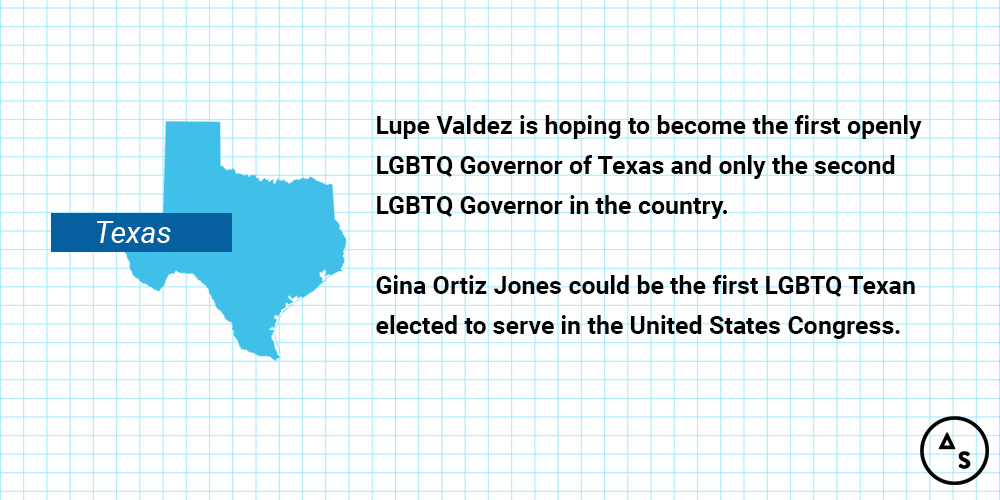
Lupe Valdez
Governor
Lupe Valdez has been a pioneer in a lot of ways in Texas. When she was elected in Dallas County in 2004, she became the nation’s first Latina lesbian sheriff. Now, she’s the first Latina lesbian to run for Texas governor. Valdez served in the U.S. army, has a master’s degree in criminology from University of Texas Arlington and was a federal agent before she took the sheriff position from 2005-2017. As sheriff, she worked to address structural problems at the county jail, improved the quality of care for mentally ill inmates, and aimed to treat everyone with respect and dignity. As a candidate for governor, she wants to close property tax loopholes that only benefit the rich, reducing property taxes and reforming the school finance system. She supports Medicaid expansion and advocates for reproductive healthcare. She says she’ll push for “common sense” gun measures and push Congress to enact comprehensive immigration reform with a pathway to citizenship. Valdez says she will advocate for more state funding for universal pre-K, college readiness programs and vocational training.
Lorie Burch
United States House of Representatives, Texas District 3
Much of today’s politics seems to abhor nuance. You’re left or right, you’re either with us or against us. And while it’s easy to get caught up in the battles that pit one side against the other, Lorie Burch is running to remind us that there’s far more that unites us than divides us.
“You can protect life and protect women’s reproductive rights. You can be fiscally responsible and have affordable healthcare and education. You can protect our borders and you can protect DREAMers,” Burch said in the kick-off to her campaign. “And you can love God — any God — and you can love the LGBT community.”
Burch is committed to protecting voting rights, creating accessible health care options, championing education, ending gridlock in Washington by bringing together different segments of the community to engage in a civil dialogue. She wants to represent the people, not the Party and not special interests and, to that end, her campaign has opted not to not to take money from PACs.
Gina Ortiz Jones
United States House of Representatives, Texas District 23
When the new administration took office, Gina Ortiz Jones stayed on the job as director in the Office of the U.S. Trade Representative. As an Iraq War veteran and trained intelligence officer, she’d worked in countries that were hostile to women and LGBT people and where conflicts of interest were blatantly disregarded, so she stayed to serve her country. But by June, she’d had enough.
“The type of people that were brought in to be public servants were interested in neither the public nor the service,” Jones told the Huffington Post. “That, to me, was a sign that I’m going to have to serve in a different way.”
Ortiz Jones left DC and returned to San Antonio to launch a Congressional bid in Texas’ only swing district. In her campaign, she is championing accessible and affordable health care, responsible immigration reform and job creation. If Ortiz can unseat the incumbent, she will become the first woman to represent the 23rd district and the first out lesbian, first Iraq War veteran and first Filipina ever elected to Congress from Texas.
Jessica González
Texas State House, District 104
Jessica González, a lesbian attorney from Dallas, TX, defeated incumbent State representative Roberto Alonzo (D-Dallas) earlier this year in the Texas primary. Since there isn’t a Republican District 104 opponent, González will serve in the 86th Texas Legislature. One of her main priorities as a member of the Texas House will be addressing affordable housing. “It’s a big problem in Dallas,” she told OutSmart magazine. “People are being forced out of their homes, and the state keeps decreasing funding for education, making the school districts rely on raising property taxes.” She also vows to take a stand against anti-LGBT legislation, like the previously proposed bathroom bill, should it come up again in the 2019 session. González is the third queer Latina to join the Texas House, along with incumbents Mary González and Celia Israel.
Mary González
Texas State House, District 75
Mary González represents District 75, which includes parts of the city of El Paso and surrounding towns, in the Texas House. Since being elected in 2012, she’s authored several bills to improve public schools, increase economic development and support agriculture. González serves on the Appropriations Committee and is Vice Chair of the Agriculture and Livestock Committee in the Texas House. She continues to be an outspoken advocate for the LGBT community and was recently mocked by fellow lawmaker Republican State Rep. Pat Fallon for being pansexual. She graciously responded with: “I’m going to continue my fight for my district and fight for Texans — all Texans, regardless of where they stand in the LGBTQ spectrum or if they’re heterosexual.” Gonzalez is running unopposed in the November election.
Celia Israel
Texas State House, District 50
Celia Israel and her partner, Celinda Garza, are longtime residents of District 50, which Israel has represented since 2014. Israel is on the House Transportation and Elections Committees, which focuses on congestion relief, public safety, multimodal innovation, and making it easier for Texans to vote. She’s also on the Transportation Sub-Committee on Long-Term Infrastructure & Planning and the Select Committee on State Real Property Data Collect, Report & Assess. In addition, she’s a member of the Legislative Study Group, the Innovation and Technology Caucus, the Women’s Health Caucus, and the Mexican American Legislative Caucus. Israel ran unopposed in the primary and will also run unopposed in the general election.
Julie Johnson
Texas State House, District 115
Julie Johnson is an attorney in Dallas County and is hoping to unseat Republican incumbent Matt Rinaldi who barely won his re-election two years ago. Johnson tells the Dallas Morning News she was inspired by the 2017 Women’s March to run for office. “I realized there was a need in this particular race for a strong female voice to counteract hate and the total assault on women’s health, our business climate and Texas families as practiced by the current officeholder,” she writes. “Additionally, I come from a family of educators, which has inspired me to become a defender of public education.” The Dallas Morning News endorsed her for her pledge to work across the aisle unlike her opponent who has been divisive in the past and because she hopes to up state spending for schools to ease the burden on taxpayers.
Stephanie Phillips
Texas State House, District 73
Stephanie Phillips is a music/performance teacher, a professional musician and a small business owner. Phillips is the first Democrat in 10 years to challenge the Republican-dominated District 73 seat and is excited to “bring new ideas, creative solutions, and a fresh point of view.” She stands for local control over aggregate mining and development in the Hill Country and would support legislation to “implement common sense land use rules and monitoring of aggregate plants at a local level.” She supports comprehensive reproductive healthcare and Medicaid expansion in Texas and would support legislation to increase funds for public schools and to increase access to voting.
Erin Zwiener
Texas State House, District 45
Erin Zwiener is bisexual, a three-time Jeopardy winner, a children’s book author, an educator, and a conservationist running for House District 45 seat, which has long remained Republican, especially during midterm years. She was inspired to run after she questioned her state representative Jason Isaac on his views on anti-immigration bill SB4 on Facebook. After a tense back-and-forth, he accused her of “trolling” him and subsequently blocked her. She decided to challenge him after their interaction and pulled off an upset, narrowly beating her Democratic opponent in the primaries. Zwiener is a local activist and was one of the lead organizers of the 2016 Electoral College demonstration at the Texas Capitol and was the lead organizer for the Indivisible Roger Williams Town Hall in Dripping Springs. Here’s where she stands on some issues: she thinks lawmakers should pass a constitutional amendment that forces the state to pay at least half of the cost of K-12 public education, which at the moment leaves taxpayers to pay more than half of public education. She would expand Medicaid to more Texans and would give the Hays Trinity Groundwater Conservation District authority to tax and levy fees like other groundwater conservation districts in Central Texas.
Utah
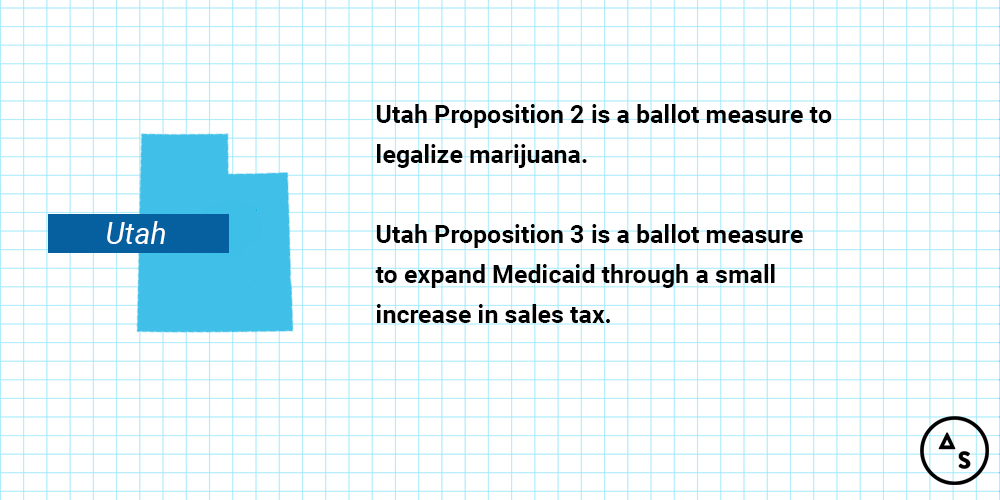
Bonus Ballot Information
+ Utah Proposition 2 would legalize medical marijuana through state statute. A yes vote “supports legalizing the medical use of marijuana for individuals with qualifying medical illnesses.”
+ Utah Proposition 3 would expand Medicaid via funding through increased sales tax. A yes vote “supports he measure to “provide Medicaid for persons under the age of 65 and with incomes equal to or below 138 percent of the federal poverty line and increase the sales tax from 4.70 to 4.85 percent to finance the state’s portion of the costs to expand Medicaid.”
Vermont
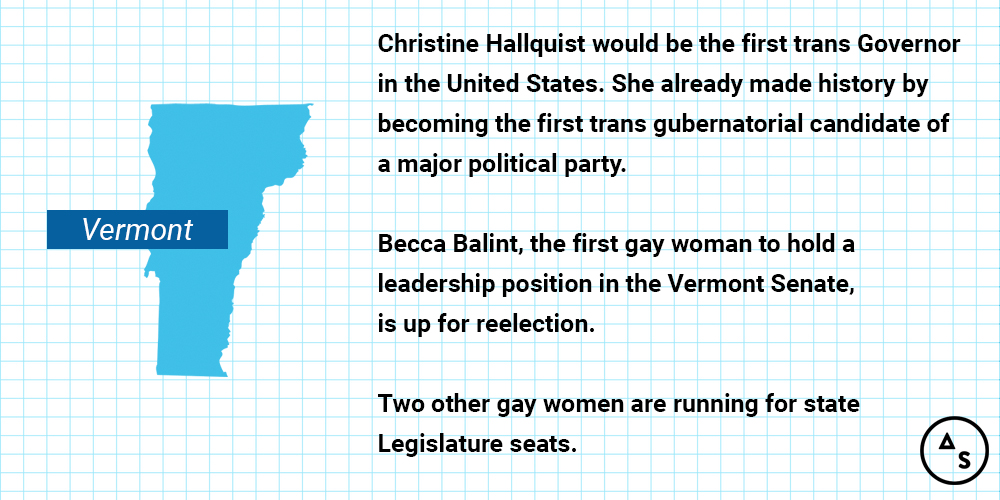
Christine Hallquist
Governor
Christine Hallquist is the Democratic party candidate for governor of Vermont, the nation’s first trans major party candidate for governor winning with over 40% of the vote. Formerly an engineer at IBM and subsequently an electrical engineer, she has strong convictions about energy and its impact on community good. She is running on a platform of increased broadband access, universal Medicare and aggressive action against climate change. She lives with her wife Pat, and has three adult children and two grandchildren. She is in need of extra support as she has recently gotten death threats and personal attacks, causing her to alter campaign appearances and not publicize the address of her Morrisville campaign headquarters.
Becca Balint
Vermont State Senate, Windham District
Becca Balint was elected to the Vermont Senate in 2014 and is the only openly LGBTQ women to hold a leadership position in the Vermont state legislature. During her tenure she has focused on education, agriculture, and women’s/LGBTQ equalty. She’s endorsed by Planned Parenthood, the National Educators Association, and Gun Sense Vermont, a grassroots gun control organization that has helped pass groundbreaking legislation in the state.
Debbie Ingram
Vermont State Senate, Chittenden District
Debbie has already served one term in the Vermont Senate (and is only one of two openly LGBTQ women in the legislative body). The general election for her district is quite competitive for a state senate seat because she serves Chittenden County, the most populated area of the Vermont. She’s a graduate of Fuller Theological Seminary and Cambridge University and spent her first term fighting for equal pay, raising the minimum wage, universal healthcare, and environmental regulations.
Kathleen James
Vermont State House, Bennington-4 District
Kathleen James is another woman running for office for the first time after being called to public service after Trump’s election. She’s been the executive director of the non profit International Skiing History Association for two decades and has served on various school boards and the communications director of an NGO that seeks to help women graduate from extreme poverty in Kenya. She’s married with two adult daughters and also runs a women’s vocal group called SoFar. Her vision for Vermont includes access to affordable healthcare (including mental healthcare) and fully funded public education for all citizens, as well as access to high-speed Internet, which is crucial for rural development.
Washington
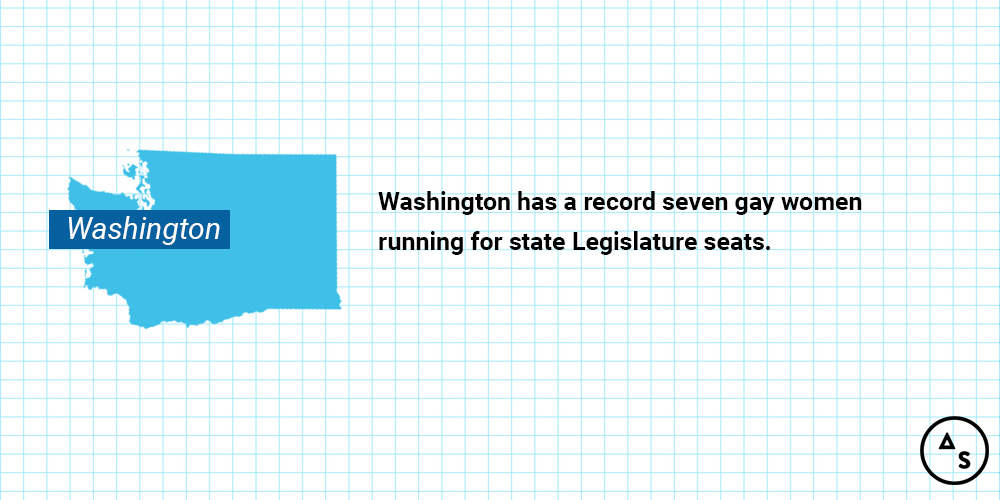
Laurie Jinkins
Washington State House, District 27a
A Democrat incumbent seeking re-election, Laurie Jinkins was the first open lesbian to serve in the Washington Legislature. She is proud of her work as a participant in achieving marriage equality in Washington. Having served for eight years, she is also proud of protecting women’s reproductive health options, and a woman’s right to choose. She chaired the Judiciary Committee in 2014, and in the last two years has worked on legislation to improve air quality, secure project funding, and keeping the roads and highways driveable. In the future, Jinkins hopes to reform taxes to make them fair, adequate and stable, invest in infrastructure and jobs for families, supporting a “sane” migration policy, work to end domestic violence, and “assuring everyone’s basic rights are protected.”
Kathy Gillespie
Washington State House, District 18b
Kathy Gillespie comes to politics with a background as a retired newspaper editor and reporter. She also served on the Vancouver Public Schools board, along with volunteering at schools and in her community. If elected, Gillespie wants to focus on directing a larger share of the state’s tax revenues toward infrastructure development, job creation, public safety, public education, and social services.
Christine Kilduff
Washington State House, District 28b
Christine Kilduff narrowly defeated her Republican opponent in 2014 to serve in the Washington House of Representatives and was re-elected in 2016. Now seeking re-election, Kilduff serves as the vice chair on the House Judiciary Committee among other committees, including those on education and veterans’ affairs. Before Kilduff was a lawmaker, she was an attorney leading an agency charged with making sure kids and parents receive due child support. A big believer in education for all, Kilduff was also elected as the president of the University Place School Board, twice. She also speaks fluent Spanish, and has been with her spouse, Colleen, for 28 years. The couple has two daughters.
Nicole Macri
Washington State House, District 43a
As the incumbent in the race, Nicole Macri was elected to the Washington House of Representatives in 2016, a departure from her job as the deputy director of Seattle’s Emergency Downtown Service Center. In the legislature, she serves as the vice chair for both the Healthcare and Wellness Committee and the Community Development, Housing, and Tribal Affairs Committee. She’s also a member of the Washington State Legislative LGBTQ Caucus. Macri focuses on progressive causes, such as issues around affordable housing, homelessness, human services, and mental health. Macri is also part of the Housing First movement. She currently serves on the Board of Directors at the Washington Low Income Housing Alliance, and lives in Seattle’s Capitol Hill neighborhood with her partner.
Emily Randall
Washington State Senate, District 26
Emily Randall is the first of her family to attend a four-year college, the daughter of a shipyard worker and a paraeducator from Port Orchard, Washington. She’s watched firsthand as her district has suffered from the recession, and if elected as a state senator, she would prioritize affordable college, apprenticeships, and job-training programs. As a college graduate, Randall would like such knowledge and skills to be accessible to everyone. She also wants to expand access to affordable healthcare for women, children, and the LGBTQ population. She lives in Kitsap County with her partner near the Puget Sound.
Claire Wilson
Washington State Senate, District 30
A career educator, Claire Wilson is a Democrat with her eyes on families and children. Wilson spent 25 years working for the Puget Sound Educational Service District, including serving as Federal Way School Board president. Wilson’s focus if elected would be on education funding, better teacher pay, protecting students who are immigrants, providing marginalized groups better access to healthcare and reproductive rights, green manufacturing, clean energy, and responsible gun ownership. Wilson identifies “proudly” as a lesbian woman and mother, with a degree from Washington State University and a Master’s degree from the University of Northern Colorado.
Jenny Goulet
Washington State House, District 9a
Jenny Goulet is hoping to be part of the blue wave that finally checks Donald Trump after the cowardice and corruption shown by the Republican party since his election. She’s a small business owner and mother whose platform includes education, infrastructure, economic development, and protecting the rights of minorities.
West Virginia
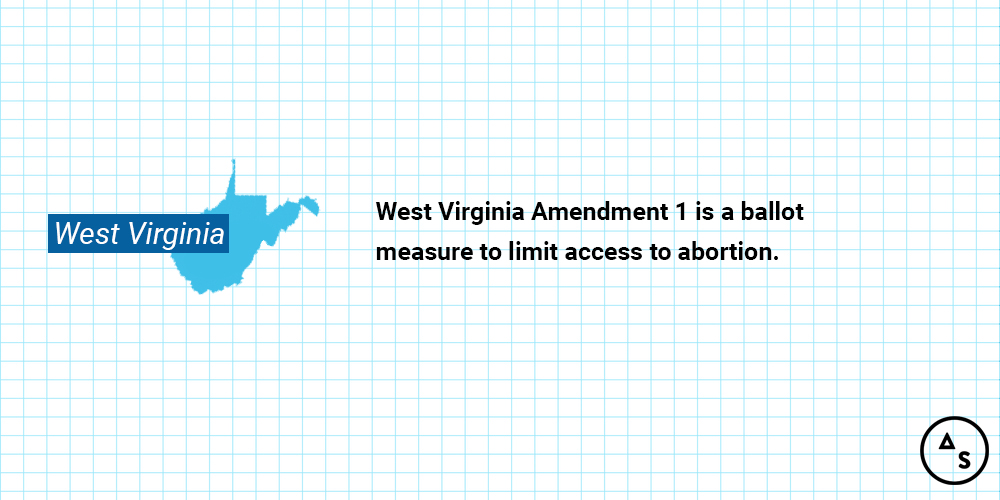
Bonus Ballot Information
+ West Virginia Amendment 1 would limit access to abortion. A no vote “opposes this amendment to add language to the West Virginia Constitution stating that “nothing in this Constitution secures or protects a right to abortion or requires the funding of abortion.”
Wisconsin
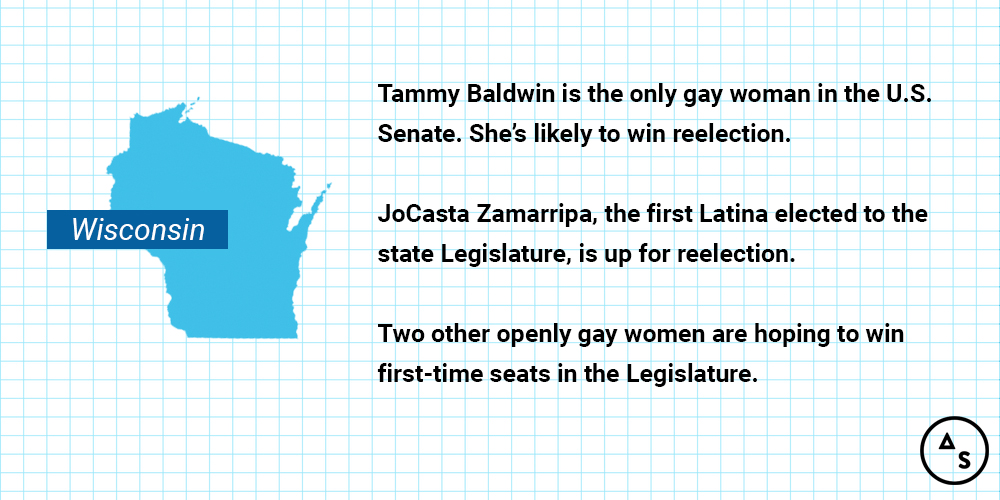
Tammy Baldwin
United States Senate
Tammy Baldwin is used to being the first. First female Senator from Wisconsin, first openly gay member of the House of Representatives, and now America’s first out Senator — you name it, she’s done it. This year finds her in another unprecedented situation: her race against current State Senator Leah Vukmir marks the first time two women are the major party nominees for the US Senate in Wisconsin.
Baldwin won her first race at age 24, so she’s been blazing trails and taking names for a while. She’s staunchly faught Trumpism in the Senate and is willing to go to the mat on issues she cares about. Most recently, she spearheaded an effort to ban the “junk” insurance plans that would undermine the Affordable Care Act. She also secured an increase of over $14 million for HIV/AIDS care in her state. She was recently recognized by the United Spinal Association for her advocacy on behalf of disabled folks and has used her experience growing up to inform her work on the opioid epidemic.
Baldwin is a founder of the Congressional LGBT Equality Caucus and, frankly, one of the queer community’s treasures in the Senate. Recent polls show her leading Vukmir by double digits after a close start.
Lee Snodgrass
Wisconsin State Senate, District 19
The Democratic Party hopes Lee Snodgrass can flip a critical seat in the Wisconsin state legislature by unseating Republican incumbent (and Trump fanboy) Roger Roth. She plans to work toward affordable access to quality healthcare, fully funded public education, gun safety, women’s health, LGBTQ equality, and stamping out Wisconsin’s horrying voter suppression. She’s endorsed by Planned Parenthood, a variety of labor unions, and several education associations. She has one son in high school and a daughter in college at Minnesota-Twin Cities, majoring in political science.
Marisabel Cabrera
Wisconsin State Assembly, District 9
Born and raised in Milwaukee’s Southside, Democrat Marisabel Cabrera is running for Wisconsin’s State Assembly on a platform that prioritizes immigration reform. As an immigration attorney, Cabrera fights to keep families together and assist immigrants in finding safety in the United States. She believes that Wisconsin needs a better, more efficient immigration system and demand stronger resources the federal government. She believes in affordable healthcare, including mental health services, and quality public schools that emphasize local leadership. Cabrera also wants to protect Milwaukee’s public water, air, and land from privatization efforts.
JoCasta Zamarripa
Wisconsin State Assembly, District 8
Running for re-election, JoCasta Zamarripa is a three term incumbent who, in 2010, won a historic election to become the first Latina woman in the Wisconsin Legislature. She publicly came out as bisexual during the launch of her 2012 campaign. Zamarripa currently serves in leadership for the Assembly Democrats as their Vice-Caucus Chair.
Born and raised in Milwaukee, Zamarripa serves the 8th district, which is home to the largest Latinx population in Wisconsin. Zamarripa champions the Latinx community; she’s a vocal advocate of immigrant’s rights, works on behalf of those undocumented, and speaks out against voter suppression. She also believes in strong K-12 schools, lowering student debt, common sense gun laws, and helping small businesses. She’s working to grant immigrant communities fair access to apply for a state driver’s card, which would increase public safety for some of those most vulnerable. Prior to a career in politics, Zamarripa worked as a community outreach coordinator for Planned Parenthood of Wisconsin and was a organizer with the Southside Organizing Committee, a nonprofit organization serving Milwaukee’s Southside community. She is the third LGBT member to serve in the Wisconsin House of Representatives.
Bonus Ballot Information
+ Democratic challenger Tony Evers has a really solid shot of unseating Republican incumbent Scott Walker in the governor’s race. Most polls show him with a slight edge; with enough voter turnout, he could unseat one of Trump’s biggest supporters at the state level.
Wyoming
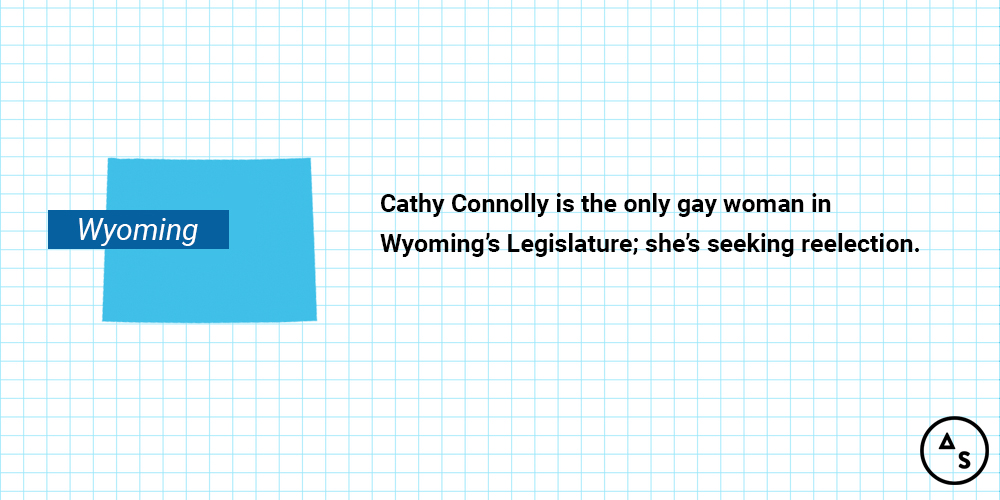
Cathy Connolly
Wyoming State House, District 13
Cathy Connolly is seeking re-election to Wyoming’s Legislature, wherein she hopes to advocate for affordable healthcare, civil rights for everyone in Wyoming, economic self-sufficiency and poverty reduction, and more attention on decreased revenues from extractive commodities. A lawmakers since 2000, She is passionate about anti-discrimination protections for children in schools when it comes to sexuality and gender, and would like policies to protect transgender students. She’s been a Laramie resident since 1992, when she moved there for a faculty position at the University of Wyoming as a professor in the Gender and Women’s Studies Program. She was recently married to Julie Heggie, and has an adult son.



AMAZING WORK
Michigan additions: Dana Nessel is Dem nominee for Attorney General, and she’s a woman married to a woman. She can win if we vote for her! Also vote YES on Michigan Proposals 2 and 3! Prop 2 is independent redistricting aka reducing gerrymandering aka “voters pick their politicians instead of politicians picking their voters”. Prop 3 is “Promote the Vote” to make registering to vote and voting easier. Passing these is last chance to keep actually-purple MI from being locked down red for a very very long time.
And vote Jocelyn Benson (Democrat) for Secretary of State to improve voting access! Thousands of Detroit votes weren’t counted in 2016 due to broken voting machines. This position affects national elections too. Fun fact – we could have three white women and a black man running MI’s exec branch if Dems win gov (Gretchen Whitmer), lt gov (Garlin Gilchrist), attn gen (Nessel), and sec of state (Benson) in MI!
I was going to add Prop 2 this afternoon! Thank you, Muffin!!
(I was already voting for Dana Nessel because I think she’s awesome, and had NO IDEA she was a woman married to another woman!! I’m going to make sure she gets added to the guide by this evening! Wooohoooo!!)
THANK YOU!!! Sources for Dana – her main campaign ad has her wife Alana (sp?): https://www.dana2018.com/, HRC said she’s openly LGBTQ here: https://www.hrc.org/blog/hrc-endorses-dana-nessel-for-michigan-attorney-general
You all are uhmazzzzzingggg! Take care <3 <3 <3
Oh, it’s also right there on her site: “Dana lives in southeast Michigan with her wife, Alanna Maguire, their twin sons, Alex and Zach, along with various cats.”
TAMMY
Tammy fangirls unite here
I haven’t lived in Wisconsin in years and I still cry about Tammy Baldwin on a bi-weekly basis.
Amazing work! Truly incredible to see this range of candidates across all 50 states.
Also! Shoutout to Liz Bennett, an old college friend. She’s INCREDIBLE and has been working her ass off for the people of Iowa for the last four years in the Iowa House (just a minor note – she’s running for reelection).
This is absolutely gorgeous, thank you team!!!
And lets go kick some butt this November!!
Kansas resident here! Correction – Kris Kobach is not the gubernatorial incumbent, he is the current secretary of state. Horrifying in all the ways. Vote Laura Kelly! (And Sharice, and Susan)
Maura Healey is Massachusetts’ current Attorney General. She’s a badass queer lady who has been fucking up the Trump administration every chance she gets.
Very cool article – slight correction: I believe Kathy Webb was the first openly gay member of the Arkansas State House. Arkansas has ridiculous term limits, so she is no longer in the Arkansas General Assembly, but she is on the Little Rock City Board. https://en.wikipedia.org/wiki/Kathy_Webb
This is great! Well done, team!
Thanks for this article! I just have 1 correction for Ohio: Mike DeWine is the Republican gubernatorial incumbent and Richard Cordray is his Democratic challenger.
Thanks for these updates, y’all! I’m tweaking the guide as they come in!
What happened to South Carolina? We have queers here too!
Do you know of any progressive queer or trans women or non-binary folks running at the state legislature or federal level in SC? The only LGBTQ candidate I could find on any database is a gay Republican named Jason Elliott running for the state House.
Addition to Massachusetts (though not for a competitive race): Jo Comerford, an out lesbian, is running unopposed for Massachusetts State Senate for the Hampshire, Franklin and Worcester District after winning the Democratic primary on a write-in campaign.
This is SO IMPORTANT!!! THANK YOU!!! I admit to being one of the many who is determined to vote, understands the importance of the election (all elections, but specifically this one), but when I look at the ballot, I’m a little confused. This is honestly more important than a lot of content, so I’m really hoping everyone reads this and takes note. VOTE VOTE VOTE VOTE VOTE
Thank you for this but a minor correction. California District 25th district includes northern LA and southern Ventura county. City of LA isn’t part of that. The 34th district is where most of LA, except for west LA, which is a different district. I have been seeing ads for Katie Hill a lot and didn’t know she was in the community. In fact her recent ads she plays up her father, and grandfather’s(paternal) military service and her dedication to fighting for veteran’s rights and healthcare. Her ads had a bit of a republican vibe imho, but I guess she trying to swayd district to vote for her.
In a related note the 48th district of California, which includes Camp Pendelton and northern San Diego county if I remember correctly is run by Tr*,p, and Put*n lackey Dana Rohrabacher. His opponent Harley Rouda has been running ads calling him a Putin lackey(has him in Russian space suit with a Russian flag on it) and a homophobe(says Dana is okay with housing discrimination against gay people). It surprised me a bit the first time I saw the ad because I thought it could backfire as some asshole would be like, “he is for that? He’s got my vote.”
Correction! in Ohio, the democrat is Richard Cordray, and the Republican is Mike DeWine. DeWine is NOT an incumbent–the current Governor, John Kasich, is not eligible for reelection. pLease update this!
Well, Team, this is highly impressive, in the AWESOME!!!! kind.
There’s no excuses now, no? Get up and vote, people.
I was weirdly surprised this week, and I must say that this happened because I’ve never payed a lot of attention to electoral systems that use electoral college (for me that’s kinda like a “democracy” and we dumped that shit in Argentina in 1994). Well, I was reading this interview on Vox with Allan J. Lichtman and then it hit me: your constitution doesn’t guarantee the right to vote to anyone, so you’re at the mercy of the States (which means at the mercy of the GoP on most cases) in regards to the most basic political right, and I think one of the most important human rights, that exists in any Democracy.
I went running to buy The Embattled Vote in America. I think this is very important book and it has some very good ideas to at least try to correct this historical mistake.
Thanks for all the hard work team!
This is amazing!!
This is awesome!
This is such an awesome resource!
Thanks for all your work on this awesome resource!
I love you all and I am very sad I only saw this today, but…Hawaii’s not even listed. You skipped from Georgia to Idaho xD
I sent in my ballot a few weeks back too (absentee) so I can’t look up our candidates. We did have Kim Coco who was a transgender woman running in the primary but she was defeated by her opponent as far as I know.
Anyway, thank you for this incredibly hard work, EVERYONE PLEASE VOTE